Religious Identities and the Race Against the Virus: American Attitudes on Vaccination Mandates and Religious Exemptions (Wave 3)
Executive Summary
Few Americans See Conflict Between Religious Beliefs and COVID-19 Vaccination
- Across nearly every major religious group, at least eight in ten people reject the idea that the teachings of their religion prohibit general vaccinations for childhood diseases.
- Few Americans say that the COVID-19 vaccine goes against their personal religious beliefs (13%) or that the teachings of their religion prohibit them from getting vaccinated (10%).
- Vaccine refusers are significantly more likely to say getting vaccinated violates their personal religious beliefs (52%) than to say getting vaccinated would violate their religion’s teachings (33%).
- Republicans are about twice as likely to say that getting vaccinated goes against their personal religious beliefs (20%) than they are to say that vaccinations violate the teachings of their religion (11%).
- Republicans who most trust far-right news outlets are about twice as likely to agree that getting vaccinated violates their personal religious beliefs (41%) than they are to agree that the teachings of their religion prohibit vaccination (22%).
- Around three in ten unvaccinated Americans (31%) say they have asked for or plan to ask for an exemption for getting a COVID-19 vaccine because it goes against their religious values. One in five parents of children under age 18 (20%) say they have asked for or will ask for a vaccine exemption for their children.
Many Americans Are Critical of Religious Exemption Claims for COVID-19 Vaccinations
- Six in ten Americans (59%) agree that too many people are using religion as an excuse to avoid COVID-19 vaccination requirements. Similarly, six in ten Americans (60%) also say there are no valid religious reasons to refuse a COVID-19 vaccine.
- On the other hand, 45% agree that no one should be allowed to claim a religious exemption to receiving a COVID-19 vaccination.
- White evangelical Protestants (38%) and other Protestants of color (38%) are the only major religious groups among whom less than a majority agree that too many people are using religion as an excuse to avoid vaccination.
- Majorities of Americans say religious exemption should be granted if someone has a document from a religious leader (51%), a record of refusing other vaccinations (55%), or belongs to a religious group that has a record of refusing other vaccines (57%). Fewer Americans (39%) believe anyone who says the vaccine goes against their religious beliefs should qualify for an exemption.
Religious Exemptions to COVID-19 Vaccine Mandate Policies Divide Americans
- A slim majority of Americans (51%) favor allowing individuals who would otherwise be required to receive a COVID-19 vaccine to refuse if doing so violates their religious beliefs, while 47% oppose such religious exemptions.
- Republicans (73%) are more likely than independents (53%) and Democrats (33%) to favor religious exemptions for vaccines.
- When asked specifically about COVID-19 vaccine mandates by the government, slightly more Americans support religious exemptions (58% favor, 41% oppose) for those who sincerely believe they violate the teachings of their religion.
- Majorities of most Christian groups say that the government should allow people to opt out of vaccinations if they sincerely believe they violate the teachings of their religion.
- Americans are less supportive of allowing religious COVID-19 exemptions for children who would otherwise be required to get them (44% favor, 54% oppose). Around two-thirds of white evangelical Protestants (66%), compared to less than half of other major religious groups, support allowing religious exemptions for children.
Few Americans Remain Hesitant to Get COVID-19 Vaccines
- As of the beginning of November 2021, nearly eight in ten Americans (77%) are vaccine acceptant. The majority of unvaccinated Americans are now vaccine refusers, at 13% of the population, compared to 9% who are hesitant.
- The profile of vaccine refusers has remained consistent across the three PRRI–IFYC surveys, with the highest rates of resistance among Republicans who most trust far-right news sources (42%), multiracial Americans (31%), and white evangelical Protestants who regularly attend religious services (30%). Black Americans are less likely to be vaccine refusers today (11%) than they were in March (19%).
- Among religious groups, Hispanic Protestants and Latter-day Saints (Mormons) increased most in vaccine acceptance. Hispanic Protestants went from 56% vaccine acceptant in June to 77% in November, and Latter-day Saints similarly increased from 65% acceptance in June to 85% in November.
- Americans are evenly divided over whether those who are eligible but refuse to get vaccinated against COVID-19 should be charged higher rates for health insurance and hospital treatment if they become infected (50% agree vs. 49% disagree).
Anger Abounds Among Vaccinated and Unvaccinated Alike
- Two-thirds of Americans who are vaccinated (67%) agree that they are “angry at those who are refusing to get vaccinated against COVID-19 and are putting the rest of us at risk.”
- Vaccinated Democrats (84%) are twice as likely as vaccinated Republicans (43%) to say they are angry at those who refuse to get vaccinated.
- On the other side, more than seven in ten unvaccinated Americans (71%) say they are “angry at those who think they have the right to tell me to get vaccinated against COVID-19.”
- Unvaccinated Republicans (85%) are significantly more likely than unvaccinated Democrats (48%) to say they are angry at those who think they have the right to tell them to get vaccinated against COVID-19.
- Four in ten Americans (42%) agree with the statement “The government is not telling us about other treatments for COVID-19 that are just as effective as the vaccine.” Republicans (62%) are more than twice as likely as Democrats (23%) to believe in this conspiracy theory, and white evangelical Protestants are the only major religious group among whom a majority (62%) believe this conspiracy theory.
- One in five Americans (19%) say that disagreements over COVID-19 vaccinations have caused major conflicts in their families, compared to 80% who disagree.
Some Parents Remain Wary of Vaccines for Children
- About four in ten Americans who are parents of children under age 18 (42%) are vaccine acceptant for their children, including 14% who say their children have already been vaccinated and 28% who say they will get their children vaccinated as soon as possible. This is a significant increase from the June rate of 35%.
- One-third of parents are hesitant to get their children vaccinated (33%, down from 40% in June), including around one in four parents (23%) who say they will wait to see how vaccines are working for other children and 10% who say they would only get their children vaccinated if it were required for work, school, or other activities.
- More than one in five parents of children under 18 say they will not get their children vaccinated (23%), the same as in June. Most of these parents are also vaccine refusers for themselves.
- Around seven in ten parents have either major (37%) or moderate (31%) concerns about COVID-19 vaccines for children, while about one-third have either few (21%) or very few (11%) concerns.
Faith-Based Approaches Have Helped Adults, Could Help With Children Getting Vaccinated
- Faith-based interventions could influence some parents to get their children vaccinated. Among parents who say they are hesitant or will refuse to get their children vaccinated, 16% report that one or more of five tested faith-based approaches could convince them to get their children vaccinated.
- Among parents who say they are hesitant or will refuse to get their children vaccinated, white Christian parents (12%) are less likely than Christian parents of color (30%) to say one or more religious approaches could positively influence their decision.
- Nearly half of vaccinated Latter-Day Saints (46%) and a majority of those who attend religious services regularly (54%) say that one or more of these faith-based approaches helped them make the decision to get vaccinated.
- More than one in four vaccinated Black Protestants (27%), other Christians (27%), and Hispanic Catholics (25%) reported the same.
Religious Exemptions to COVID-19 Vaccination Requirements
Personal Views About Religious Exemptions and Religious Beliefs
Religious Prohibitions of Vaccinations for Childhood Diseases
Less than one in ten Americans (8%) agree that the teachings of their religion prohibit vaccinations for childhood diseases, while 89% disagree, including 72% who strongly disagree. There are only minimal differences in agreement with this statement across demographic, partisan, and educational lines. However, COVID-19 vaccination status makes a significant difference: COVID-19 vaccine refusers (20%) and those who are hesitant (15%) are somewhat more likely than those who are acceptant (5%) to agree that their religion prohibits vaccinations.
Notably, there is no religious group in which more than one in five people believe that the teachings of their religion prohibit vaccinations for childhood diseases. Hispanic Protestants (19%), Black Protestants (16%), other non-Christian religious Americans (13%), and other Christians (12%) are most likely to agree that the teachings of their religions prohibit vaccinations against childhood diseases, compared to less than one in ten of all other religious groups, including white evangelical Protestants (9%), other Protestants of color (8%), religiously unaffiliated Americans (7%), white mainline Protestants (7%), Hispanic Catholics (6%), white Catholics (5%), Jewish Americans (4%), and Latter-day Saints (3%).[1]
“My Religious Beliefs” vs. “Teachings of My Religion”
The survey questionnaire included two distinct questions that were designed to discover whether Americans think getting a COVID-19 vaccine violates their personal religious beliefs or whether it specifically violates the teachings of their religion. Half of respondents were asked whether “receiving the COVID-19 vaccination goes against my religious beliefs,” while the other half were asked whether “the teachings of my religion prohibit receiving a COVID-19 vaccination.”
Few Americans agree with either statement. Americans are only slightly more likely to say that the COVID-19 vaccine goes against their personal religious beliefs (13%) than they are to say that the teachings of their religion prohibit them from getting vaccinated (10%). However, there are significant differences among groups that have higher proportions of vaccine refusers. Among vaccine refusers, a slim majority (52%) say getting vaccinated violates their personal religious beliefs, compared to one-third (33%) who say getting vaccinated would violate their religion’s teachings. There are no statistically significant differences between the two statements among vaccine accepters or vaccine-hesitant Americans.
Republicans are about twice as likely to say that getting vaccinated goes against their personal religious beliefs (20%) than they are to say that vaccinations violate the teachings of their religion (11%). Republicans who most trust far-right news outlets are about twice as likely to agree that getting vaccinated violates their personal religious beliefs (41%) than they are to agree that the teachings of their religion prohibit vaccination (22%). There are no meaningful differences between the two statements among independents and Democrats.
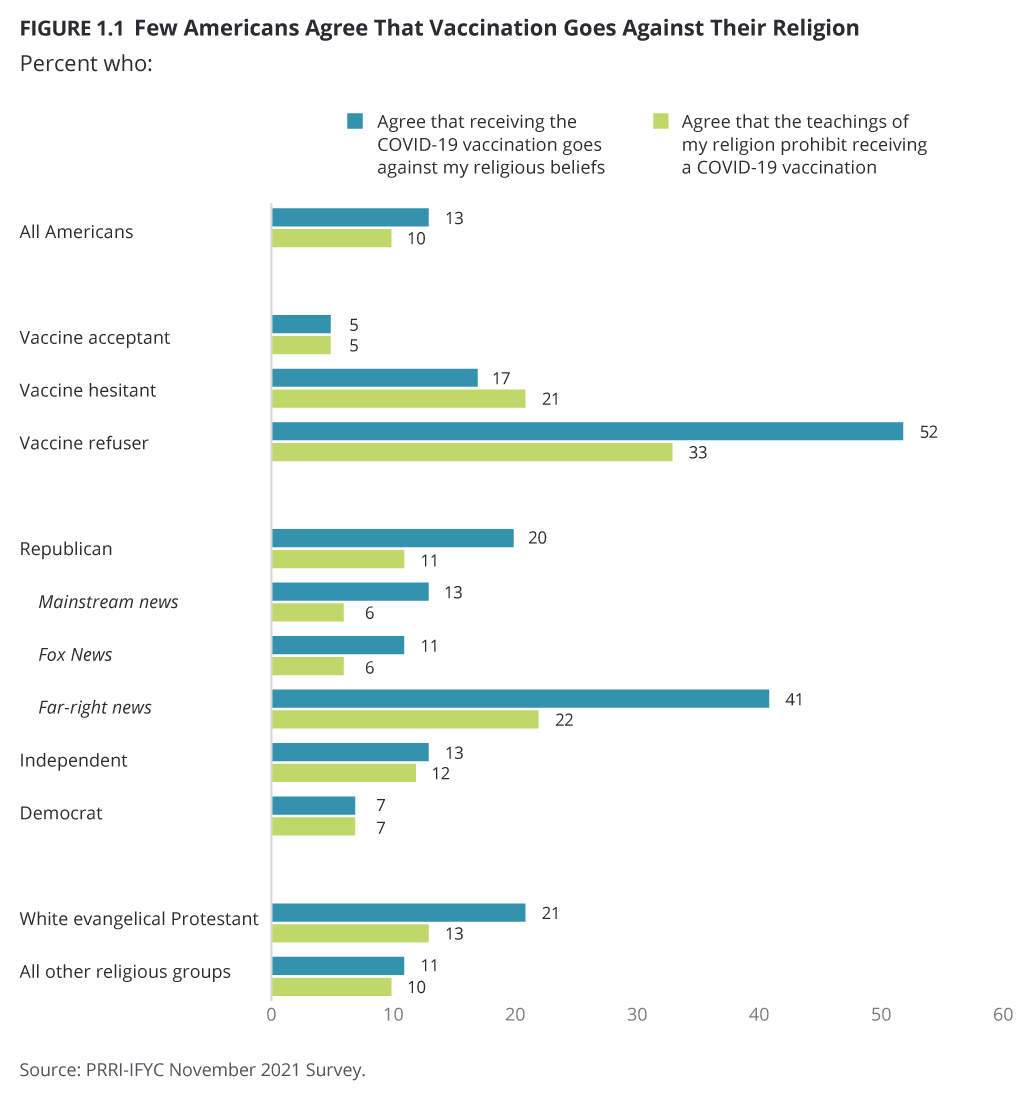
White evangelical Protestants are the only religious group among whom there is a difference between the two statements on religious prohibitions: 21% agree that getting vaccinated against COVID-19 goes against their personal religious beliefs, compared to 13% who say it goes against the teachings of their religion.
Vaccination as an Example of Loving Your Neighbor
About six in ten Americans (59%) agree with the statement “Because getting vaccinated against COVID-19 helps protect everyone, it is a way to live out the religious principle of loving my neighbors,” while 40% disagree. The share of Americans who agree with this statement is slightly larger than the shares who agreed in June (56%) and March (53%).
With the notable exceptions of white evangelical Protestants (42%) and other Protestants of color (45%), majorities of every other religious group agree that getting vaccinated is a way to practice the principle of loving your neighbors. This includes 51% of Hispanic Protestants, 59% of white mainline Protestants, 60% of white Catholics, 62% of religiously unaffiliated Americans, 63% of Black Protestants, 65% of other Christians, 66% of Hispanic Catholics, 69% of other non-Christian religious Americans, 71% of Latter-day Saints, and 75% of Jewish Americans.
Just 8% of those who say they will not get vaccinated agree that getting vaccinated is a way of loving your neighbor, compared to 28% of people who are vaccine hesitant. These shares are similar to the shares in June and somewhat smaller than the shares in March, when 40% of vaccine-hesitant Americans and 14% of vaccine refusers agreed that getting vaccinated was an example of loving their neighbors.
Americans with postgraduate degrees (77%) or four-year college degrees (68%) are more likely than those with some college experience but no four-year degree (56%) or a high school degree or less (49%) to say that getting vaccinated is a way of loving their neighbors.
Who Will Ask for Religious Exemptions?
Around three in ten unvaccinated Americans (31%) say they have asked for or plan to ask for an exemption from getting a COVID-19 vaccine because it goes against their religious values. One in five parents of children under age 18 (20%) say they have asked for or will ask for a vaccine exemption for their children.
Unsurprisingly, Americans who say they will not get vaccinated are much more likely to say they will request a religious exemption for themselves than those who are vaccine hesitant (44% vs. 19%). This pattern is similar when parents consider exemptions for their children: 24% of vaccine-hesitant parents say they will ask for a religious exemption for their children, versus 49% of vaccine-refusing parents.
Unvaccinated Republicans (34%) are slightly more likely than unvaccinated Democrats (25%) to say they will seek out a religious exemption for vaccination. Three in ten unvaccinated independents say the same (30%). Nearly half of unvaccinated Republicans who most trust far-right news media (47%), compared to fewer of those who trust Fox News (28%) or mainstream news (25%), say they will seek out a religious exemption. Republican parents (24%) and independent parents (21%) are more likely than Democrat parents (12%) to say they will seek out a religious exemption for their children.
Among unvaccinated Americans, around four in ten white evangelical Protestants (41%) say they plan to ask for a religious exemption for vaccination against COVID-19, compared to 30% of white mainline Protestants, 26% of white Catholics, and 19% of religiously unaffiliated Americans.[2] Parents of children under age 18 in these groups are less likely to say they will ask for religious exemptions for their children, including 26% of white evangelical Protestants, 24% of white mainline Protestants, 15% of white Catholics, 14% of religiously unaffiliated Americans, and 13% of Hispanic Catholics.[3]
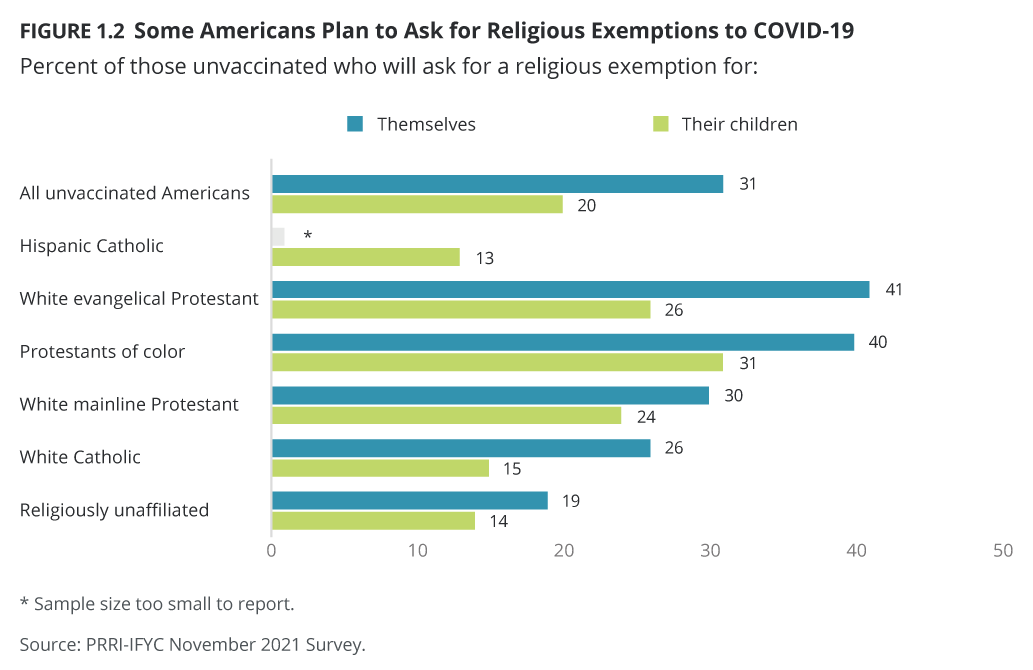
Unvaccinated people over age 65 (16%) are less likely than Americans ages 50–64 (31%), ages 30–49 (34%), and ages 18–29 (30%) to say they will seek out a religious exemption. Interestingly, there are no other gaps between racial or ethnic groups, between genders, or across levels of formal education in whether unvaccinated Americans will seek out religious exemptions.
Should Religious Refusals Even Exist for COVID-19 Vaccinations?
Religious Exemptions for Adults
Americans remain divided over whether religious exemptions to COVID-19 vaccine requirements should exist. A slim majority of Americans (51%) favor allowing individuals who would otherwise be required to receive a COVID-19 vaccine to refuse if doing so violates their religious beliefs, while 47% oppose such religious exemptions. The share of Americans who favor allowing exemptions is similar to the share recorded in June (52%) and slightly smaller than the share recorded in March, when 56% of Americans favored them. In January, just under half of Americans (48%) favored allowing religious exemptions.
Republicans (73%) are more likely than independents (53%) and Democrats (33%) to favor religious exemptions for vaccines. These shares are mostly unchanged since June (69%, 53%, and 37% among Republicans, independents, and Democrats, respectively). Nine in ten Republicans who most trust far-right news outlets (90%), compared to 79% of Republicans who most trust Fox News and 51% of Republicans who most trust mainstream news, say that there should be religious exemptions to COVID-19 vaccination mandates.
Unsurprisingly, vaccine refusers overwhelmingly support allowing religious exemptions (85%), compared to 73% of vaccine-hesitant Americans and 44% of vaccine-acceptant Americans. Americans who know someone who died from COVID-19 (49%) are slightly less likely to believe there should be religious exemptions than those who do not know someone who died from COVID-19 (54%).
Among religious groups, white evangelical Protestants (76%) are most likely to favor allowing religious exemptions, followed by majorities of Latter-day Saints (66%), other Protestants of color (61%), white mainline Protestants (57%), and white Catholics (55%). Less than half of Black Protestants (49%), Hispanic Protestants (48%), Hispanic Catholics (46%), other Christians (44%), other non-Christian religious Americans (43%), Jewish Americans (38%), and religiously unaffiliated Americans (38%) favor allowing religious exemptions for COVID-19 vaccines.
A majority of white Americans (55%), compared to less than half of multiracial Americans (48%), Black Americans (48%), Hispanic Americans (47%), and Americans of other races (40%), favor allowing religious exemptions for COVID-19 vaccinations. [4]
Support for allowing religious exemptions decreases with greater levels of formal education. Majorities of Americans with a high school degree or less (54%) or some college experience but no four-year degree (56%) favor exemptions, while less than half of those with four-year college degrees (47%) or postgraduate degrees (41%) say the same.
Religious Exemptions for Children
Americans are slightly less supportive of allowing religious COVID-19 vaccine exemptions for children who would otherwise be required to get them. Around four in ten Americans (44%) favor exemptions for children, while a majority (54%) oppose exemptions. These shares are generally comparable to shares in June (42% favor, 57% oppose), but Americans are much more likely to favor allowing religious exemptions to COVID-19 vaccines for children now than they were in January, when 27% were in favor and 73% were opposed.
Republicans (65%) are most likely to favor allowing religious vaccine exemptions for children, a larger proportion than in June (58%). Just under half of independents (47%) support allowing religious exemptions for children, a slight uptick from June (41%). One in four Democrats (25%) support allowing religious exemptions for children, a slightly smaller share than in June (29%). Eight in ten Republicans who most trust far-right news outlets (81%) and seven in ten who most trust Fox News (69%) favor allowing exemptions for children. Less than half of Republicans who most trust mainstream news outlets agree (47%).
Around two-thirds of white evangelical Protestants (66%) support allowing religious exemptions for children, along with a majority of other Protestants of color (64%). Less than half of other religious groups agree, including 49% of Hispanic Protestants, 49% of Latter-day Saints, 47% of white Catholics, 46% of white mainline Protestants, 41% of Hispanic Catholics, 40% of other Christians, 38% of Black Protestants, 36% of other non-Christian religious Americans, 32% of religiously unaffiliated Americans, and 29% of Jewish Americans. Support for allowing religious vaccine exemptions for children has decreased most since June among Latter-day Saints (down from 59%) and Black Protestants (down from 45%). Support for exemptions has increased dramatically from June among other Protestants of color (up from 46%).
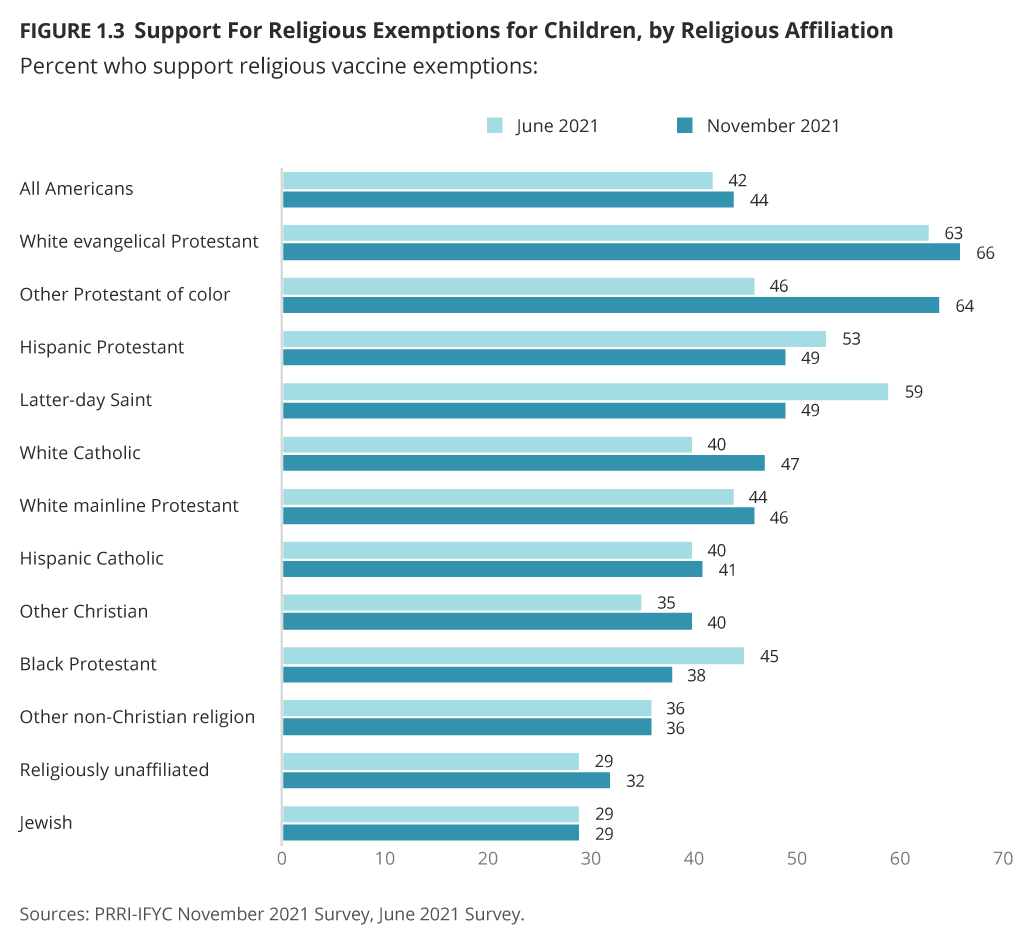
Less than half of all racial and ethnic groups favor allowing vaccine exemptions for children, including 48% of multiracial Americans, 46% of white Americans, 45% of Hispanic Americans, 39% of Black Americans, and 33% of Americans of other races. Multiracial Americans are much more likely to favor exemptions now than they were in June (up from 39%).
Around half of Americans with a high school degree or less (49%) or some college but no four-year degree (47%) support allowing religious exemptions for children, compared to 39% of Americans with four-year degrees and 31% of Americans with postgraduate degrees.
Should the Government Allow Religious Exemptions?
Slightly more Americans favor religious exemptions when asked specifically about government vaccine mandates. Respondents in the survey were asked to choose between two opposing statements of how the government should respond if someone has a sincerely held religious belief that getting vaccinated goes against the teachings of their religion:
- The government should allow them to opt out of getting vaccinated, OR
- The government should still require them to get vaccinated for the safety of the rest of society
Nearly six in ten Americans (58%) say they agree more with the first statement that the government should allow religious exemptions, while 41% say the government should still require them to get vaccinated even if they have a sincerely held belief that it would violate the teachings of their religion.
Vaccine-acceptant Americans are almost evenly divided between the two statements. Just under half (48%) agree with the first statement, while a slim majority (51%) say the government should still require vaccinations. Vaccine-hesitant Americans (83%) and vaccine refusers (97%) almost all agree more that the government should allow people to opt out. Americans who know someone who has died from COVID-19 are slightly less likely than those who do not know anyone who died to say people should be allowed to opt out (55% vs. 61%).
Eight in ten Republicans (80%) and six in ten independents (61%), compared to just over one-third of Democrats (36%), say the government should allow religious exemptions. Republicans who most trust far-right news (96%) and Fox News (86%) overwhelmingly choose to allow people to opt out of vaccinations, compared to 58% of Republicans who most trust mainstream news sources.
Majorities of most Christian groups say that the government should allow people to opt out of vaccinations if they sincerely believe they violate the teachings of their religion. This includes 82% of white evangelical Protestants, 71% of other Protestants of color, 66% of Latter-day Saints, 65% of white mainline Protestants, 63% of Hispanic Protestants, and 60% of white Catholics. Half or less of Black Protestants (50%), religiously unaffiliated Americans (49%), other Christians (48%), other non-Christian religious Americans (48%), Jewish Americans (45%), and Hispanic Catholics (40%) agree. Americans who attend religious services at least a few times a year are more likely than those who seldom or never attend services to say the government should allow people to opt out of vaccinations (69% vs. 51%).
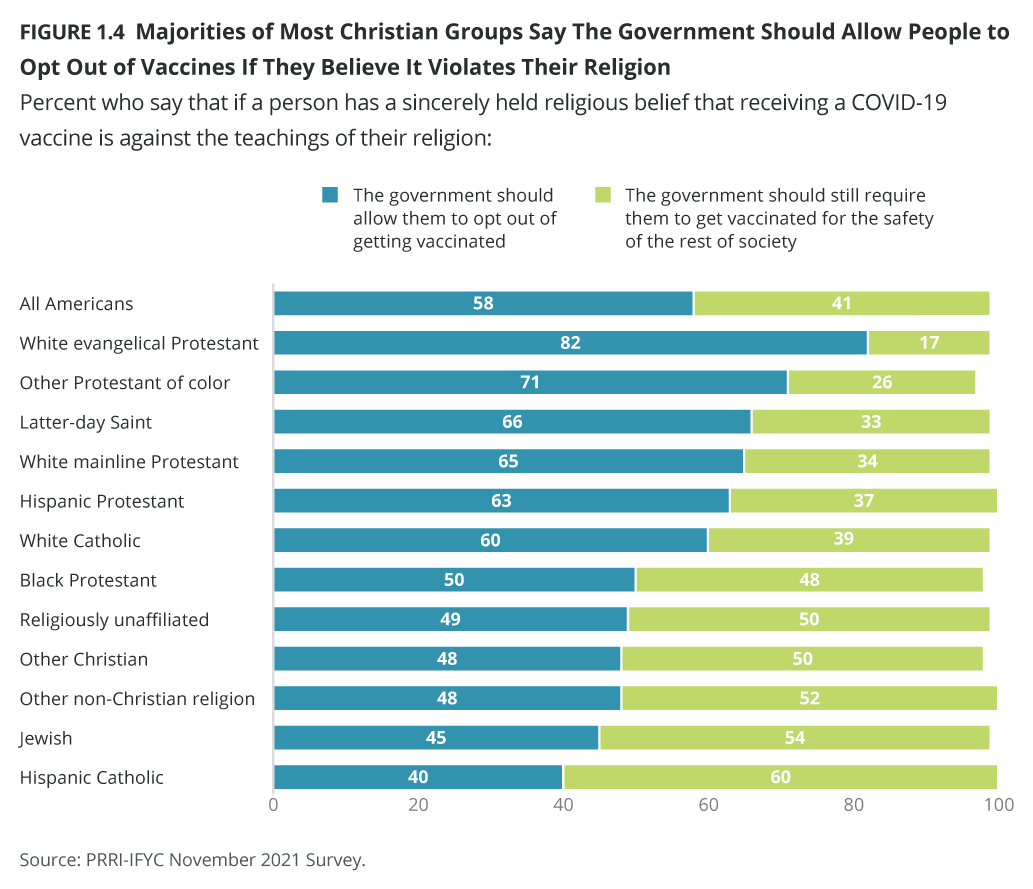
Most Americans Say There Are No Religious Reasons to Refuse Vaccines
Despite half of Americans favoring allowing religious exemptions for COVID-19 exemptions, six in ten Americans (60%) agree with the statement that “There are no valid religious reasons to refuse a COVID-19 vaccine,” while 38% disagree.
Nearly eight in ten Democrats (78%) and a solid majority of independents (57%) agree that there are no valid religious reasons to refuse a vaccine. Less than half of Republicans agree (43%). Just 16% of Republicans who most trust far-right news agree, along with 40% of Republicans who most trust Fox News. By contrast, more than six in ten Republicans who most trust mainstream news outlets (62%) agree that there are no valid religious reasons to refuse a COVID-19 vaccine.
Unsurprisingly, vaccine-acceptant Americans (69%) are much more likely than vaccine-hesitant Americans (36%) and vaccine refusers (19%) to agree that there are no valid religious reasons to refuse a vaccine. Americans who know someone who died from COVID-19 (63%) are slightly more likely than those who do not know anyone who has died (57%) to say the same.
White evangelical Protestants (41%) are the only religious group among whom less than half agree that there are no valid religious reasons to refuse a COVID-19 vaccine. Six in ten or more religiously unaffiliated Americans (69%), Hispanic Catholics (68%), other Christians (68%), Jewish Americans (67%), Hispanic Protestants (64%), white Catholics (62%), and Latter-day Saints (60%) agree that there are no valid religious reasons to refuse a vaccine. Majorities of Black Protestants (59%), other non-Christian religious Americans (59%), white mainline Protestants (56%), and other Protestants of color (51%) say the same. A majority of Americans who attend religious services at least a few times a year (52%), compared to around two-thirds of Americans who seldom or never attend services (65%), say there are no valid reasons for refusing a vaccine.
Two-thirds of Hispanic Americans (66%) and Americans of other races and ethnicities (66%), along with majorities of white Americans (59%), Black Americans (56%), and multiracial Americans (51%), agree that there are no valid religious reasons to refuse a COVID-19 vaccine.
Majorities of Americans across education levels agree that there are no religious reasons to refuse a COVID-19 vaccine, including 56% of those with a high school degree or less, 56% of those with some college experience but no four-year degree, 66% of those with four-year degrees, and 67% of those with postgraduate degrees.
Most Americans Also Think Too Many Are Claiming Religious Beliefs as an Excuse
Further complicating the divisions over religious exemptions, around six in ten Americans (59%) agree with the statement that “Too many people are using religion as an excuse to avoid COVID-19 vaccination requirements,” while 40% disagree.
A majority of independents (57%) and more than three in four Democrats (77%), compared to four in ten Republicans (41%), agree that too many people are using religion as an excuse to avoid vaccine requirements. Unsurprisingly, Republicans who most trust far-right news outlets (18%) and Fox News (35%) are much less likely than those who trust mainstream outlets (62%) to agree that too many people are using religion to avoid vaccination.
Again, white evangelical Protestants (38%) as well as other Protestants of color (38%) are the only religious groups among whom less than a majority agree that too many people are using religion as an excuse to avoid vaccination. Around two-thirds or more of Jewish Americans (72%), Latter-day Saints (68%), religiously unaffiliated Americans (67%), and other non-Christian religious Americans (67%) agree, as do about six in ten Hispanic Catholics (63%), other Christians (62%), Black Protestants (62%), white mainline Protestants (59%), white Catholics (59%), and Hispanic Protestants (58%), and Hispanic Protestants (58%). Half of Americans who attend religious services at least a few times a year (50%), compared to more than six in ten who seldom or never attend services (64%), agree.
Majorities of all racial and ethnic groups agree that too many people are using religion as an excuse to avoid vaccination, including 63% of Hispanic Americans, 62% of Americans of other races, 57% of white Americans, 57% of Black Americans, and 54% of multiracial Americans.
Agreement that too many people are using religion as an excuse to avoid vaccination increases with greater levels of education, though majorities of Americans of all levels of education agree. This includes 53% of those with a high school degree or less, 56% of those with some college experience but no four-year degree, 66% of those with a four-year degree, and 69% of those with a postgraduate degree.
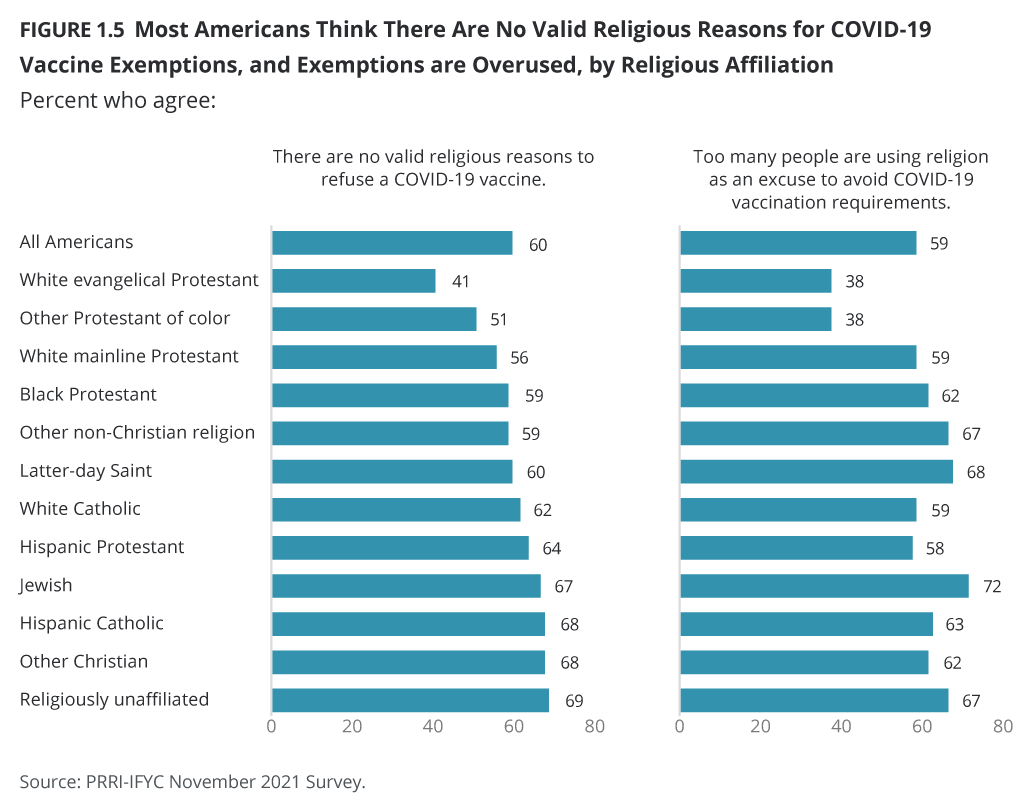
Who Should Get a Religious Exemption?
The survey tested a series of qualifications for who should qualify for a religious exemption:
- No requirements: Anyone who simply says that receiving a COVID-19 vaccination goes against their religious beliefs should be able to claim a religious exemption.
- Personal history requirements: Anyone who individually has a record of refusing to receive other vaccinations because they go against their religious beliefs should be able to claim a religious exemption.
- Religious group requirements: Anyone who belongs to a religious group that has a record of refusing to receive other vaccinations because they go against their religious beliefs should be able to claim a religious exemption.
- Religious documentation requirements: Anyone who has a document from a religious leader certifying that receiving a COVID-19 vaccination goes against their religious beliefs should be able to claim a religious exemption.
- No exemptions: No one should be allowed to claim an exemption from receiving a COVID-19 vaccine based on their religious beliefs.
Four in ten Americans (39%) agree with the loosest exemption requirements—that anyone who says that the vaccines go against their religious beliefs should qualify for an exemption. On the other hand, 45% agree that no one should be allowed to claim a religious exemption to receiving a COVID-19 vaccination. Majorities of Americans say an exemption should be granted if the person has a document from a religious leader (51%), if the individual has a record of refusing other vaccinations (55%), and if the person belongs to a religious group that has a record of refusing other vaccines (57%). Responses to these three requirement questions are very closely correlated, with only small differences in responses among subgroups.
Just three in ten vaccine-acceptant Americans (29%) say there should be no requirements for religious exemptions, and 54% say there should be no religious exemptions. Vaccine-hesitant Americans and vaccine refusers are much more likely to agree that there should be no requirements (63% and 87%, respectively). One in five vaccine-hesitant Americans (22%) and one in ten vaccine refusers (11%) say there should be no religious exemptions.
A majority of Republicans support exemptions with no requirements (57%), and only one in four (26%) say there should be no religious exemptions. Independents are less likely than Republicans to say there should be no requirements to claim a religious exemption (41%), while four in ten (44%) say there should be no religious exemptions. Two in ten Democrats (23%) say there should be no requirements for exemptions, and nearly two-thirds (65%) say there should be no religious exemptions.
Eight in ten Republicans who most trust far-right news say there should be no requirements to claim a religious exemption (81%) and just 10% say there should be no religious exemptions. Fox News Republicans are less united: 64% say there should be no requirements for religious exemptions and 21% say there should be no religious exemptions.
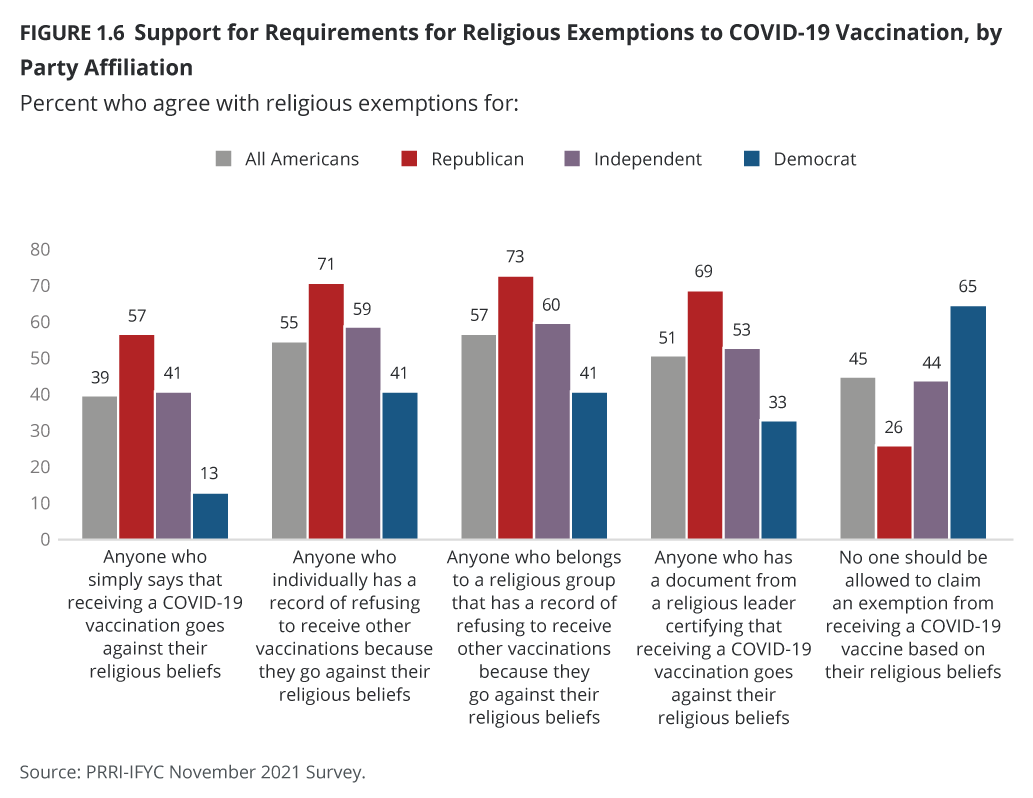
White evangelical Protestants (61%) and other Protestants of color (51%) are most likely to say there should be no requirements for religious exemptions for vaccination against COVID-19. Less than half of other religious groups say the same, including 45% of Hispanic Protestants, 42% of white mainline Protestants, 39% of Latter-day Saints, 38% of Black Protestants, 36% of non-Christian religious Americans, 32% of religiously unaffiliated Americans, 31% of Hispanic Catholics, and 20% of Jewish Americans.
Majorities of Jewish Americans (60%), religiously unaffiliated Americans (57%), other Christians (57%), Hispanic Catholics (56%), and non-Christian religious Americans (52%) say there should be no religious exemptions for COVID-19 vaccinations. Less than half of Hispanic Protestants (47%), white Catholics (44%), Latter-day Saints (43%), Black Protestants (42%), white mainline Protestants (41%), other Protestants of color (37%), and white evangelical Protestants (24%) agree.
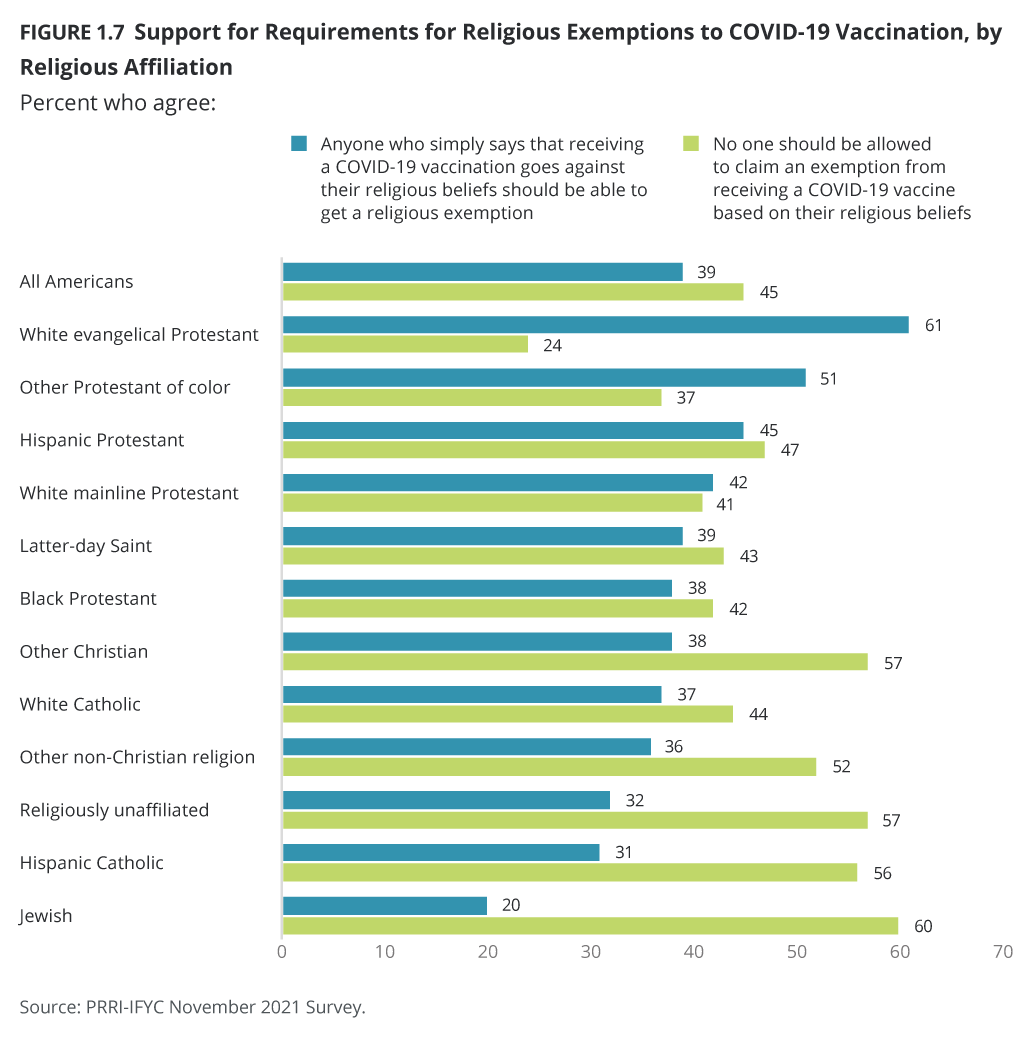
Half of Americans who attend religious services at least a few times a year or more (50%), compared to 34% of those who seldom or never attend services, say that there should be no requirements for claiming a religious exemption for a COVID-19 vaccine. Just over one-third of those who at least sometimes attend services (36%), compared to a majority (53%) of those who seldom or never attend services, say there should be no religious exemptions. These patterns are mostly driven by white evangelical Protestants who attend services regularly, among whom 68% say there should be no requirements for claiming a religious exemption and 17% say there should be no religious exemptions.
Vaccine Access and Hesitancy
As of the beginning of November, nearly eight in ten Americans (77%) are vaccine accepters, including three in four Americans (74%) who report that they have received at least one dose of a COVID-19 vaccine and an additional 4% who say they will get vaccinated as soon as possible.[5] The current levels of vaccine uptake represent a marked 20-point increase compared to March, when 58% of Americans were vaccine accepters, and a small increase since June, when 71% were vaccine accepters.
One in ten Americans (9%) are vaccine hesitant, including 5% who say they will wait to see how vaccines are working for others and 4% who will only get vaccinated if it is required for work, school, or other activities. In March, more than three times as many were vaccine hesitant (28%), and in June that figure had dropped to 15%. Vaccine refusers—those who say they definitely will not get a COVID-19 vaccine—comprise 13% of Americans, similar to the 13% recorded in June and the 14% recorded in March. This group now makes up the majority of unvaccinated Americans.
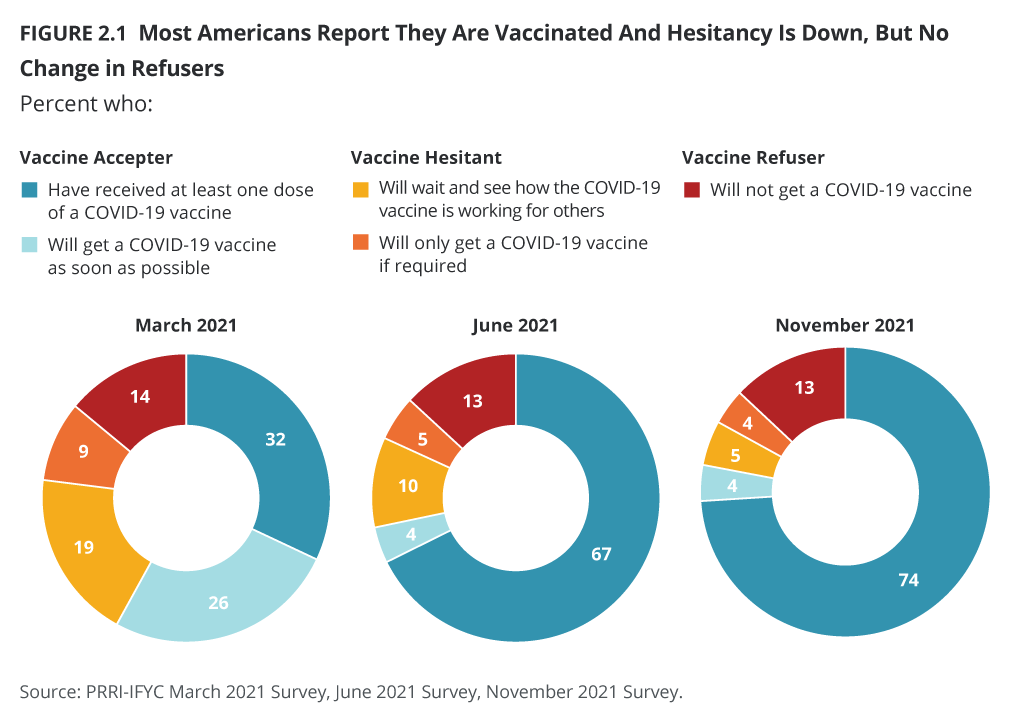
Nearly three in four Americans (74%) say that a family member has received at least one dose of a vaccine, a majority (61%) say a close friend has received at least one dose, and 54% say an acquaintance has received at least one dose. Just three percent of Americans report that they do not know anyone who has received at least one dose of a COVID-19 vaccine. Among those who are vaccinated, 78% report that a family member has received at least one dose of a vaccine, 70% report that a close friend has received at least one dose, and a majority (61%) report that an acquaintance has received at least one dose. By contrast, among those who are not vaccinated, 65% report that a family member has received at least one dose of a vaccine, 37% report that a close friend has received at least one dose, and 34% report that an acquaintance has received at least one dose.
Party Affiliation and Vaccine Hesitancy
While Republicans have increased significantly in vaccine acceptance, from 45% in March to 63% in June and 68% in November, they remain significantly more likely than Democrats and independents to say that they will refuse to get vaccinated against COVID-19. About three in ten Republicans are either vaccine hesitant (10%) or vaccine refusers (22%). By contrast, more than nine in ten Democrats (91%) are vaccine accepters, only 6% of Democrats remain hesitant, and only 3% are refusers. Three in four independents are accepters (75%), 10% are hesitant, and 13% are refusers.
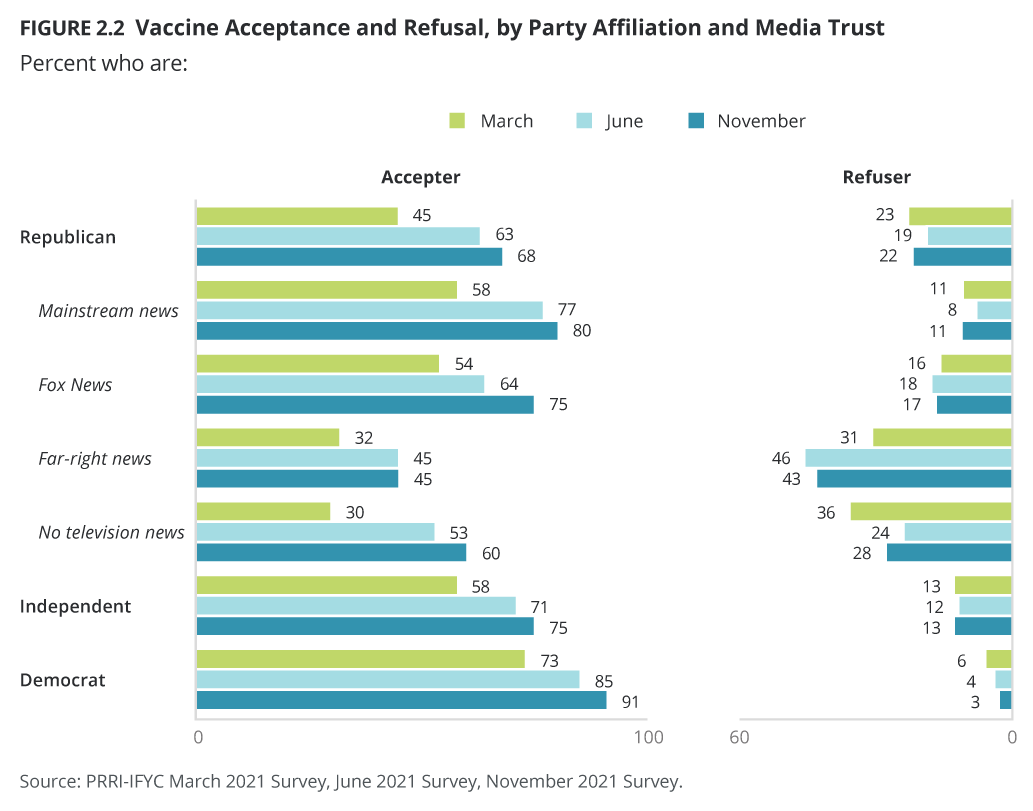
Divisions persist among Republicans by which television news outlets they trust most. Republicans who most trust mainstream news outlets are more likely than Americans on average to be vaccine accepters, while 8% are hesitant and 11% say they will not get vaccinated. Three in four Republicans who most trust Fox News report being vaccine accepters (75%), while 9% are hesitant and 17% refuse to get vaccinated. Republicans who do not trust TV news sources are less likely to say they are vaccinated: 60% are vaccine accepters, 12% are hesitant, and 28% refuse. Notably, less than half of Republicans who most trust far-right news (45%) are vaccine accepters, while 12% are hesitant and 43% say they refuse to get vaccinated.
Religious Affiliation and Vaccine Hesitancy
Among religious groups, patterns of vaccine uptake fluctuate between June and November. Jewish Americans are most likely to be vaccine accepters (94%), notably up from 85% in June and March. Latter-day Saints, Hispanic Catholics, and Hispanic Protestants have increased most in vaccine acceptance since March. Latter-Day Saints increased from 50% in March to 65% in June and 85% in November. Hispanic Catholics increased from 56% in March to 80% in June and 90% in November, while Hispanic Protestants increased from 43% in March to 56% in June and 77% in November. Black Protestants also increased significantly since March, from 49% to 66% in June and 74% in November.
About eight in ten white Catholics (82%, up from 68% in March), other Christians (81%, up from 64% in March), other non-Christians (79%, up from 64% in March), the religiously unaffiliated (79%, up from 60% in March), and white mainline Protestants (76%, up from 63% in March) are also vaccine accepters, as are about two-thirds of other Protestants of color (67%, up from 45% in March).
Even though white evangelical Protestants remain the religious group with the lowest percentage of vaccine accepters, they have steadily grown more acceptant, from 45% in March to 65% in November.
Changes in acceptance have come from decreases in hesitancy. With the exceptions of Black Protestants and Hispanic Catholics, the proportions of religious groups that say they will not get vaccinated have held steady since March. Fewer Black Protestants (7% in November, 19% in March) and Hispanic Catholics (4% in November, 10% in March) say they will not get vaccinated.
There are no meaningful differences across religious groups between those who attend religious services at least a few times a year and those who seldom or never attend services, except among white evangelical Protestants. White evangelical Protestants who are more frequent church attenders (61%) are less likely than infrequent church attenders (73%) to be vaccine acceptant. Both groups have increased in acceptance since March (43% and 48%, respectively).
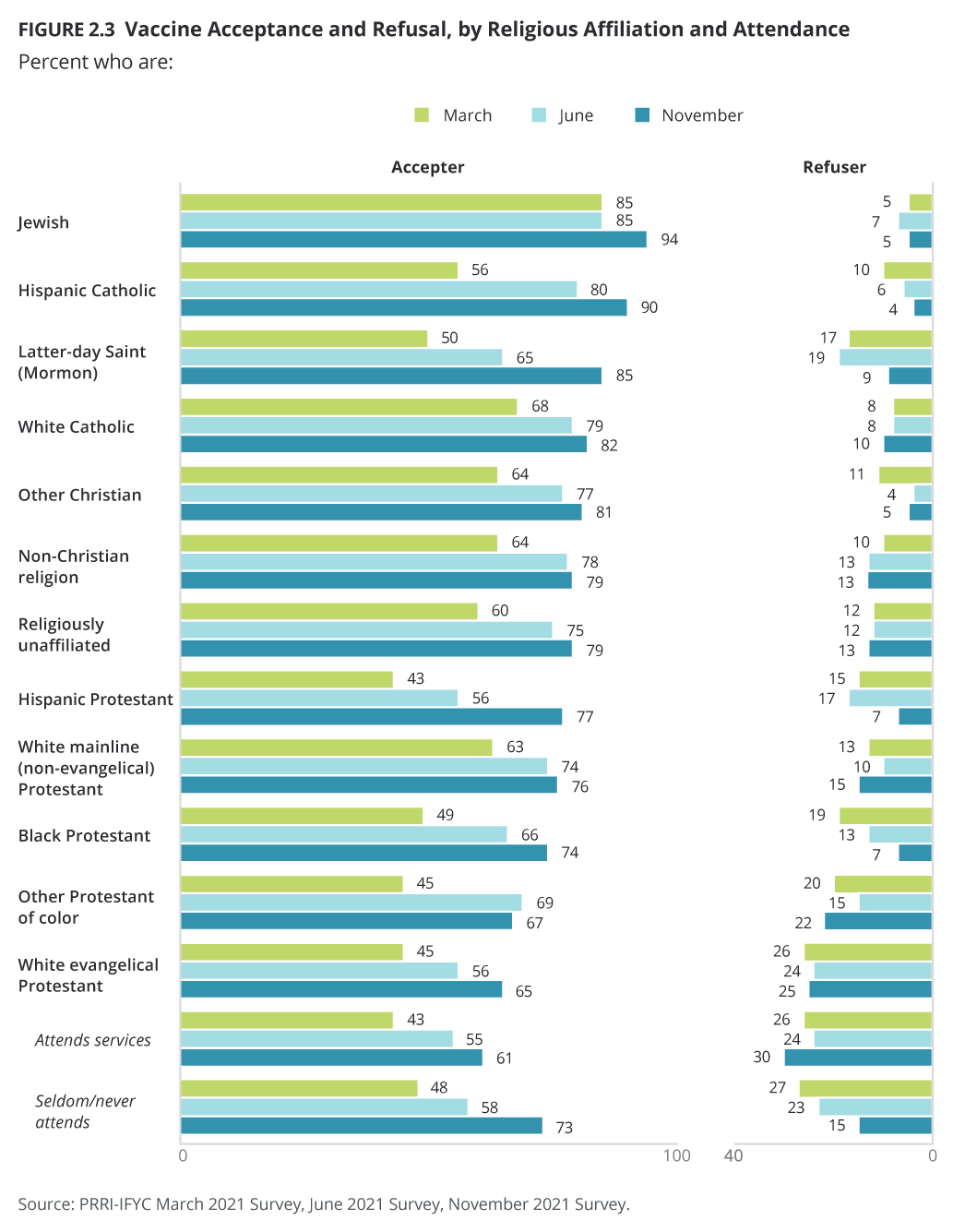
Demographics and Vaccine Hesitancy
Race and Ethnicity
Sizable majorities of Americans of all racial and ethnic groups are vaccine acceptant, including Americans of other races (86%), Hispanic Americans (83%), white Americans (76%), Black Americans (72%), and multiracial Americans (61%).
While the proportions of groups that remain hesitant have shrunk, the proportions of groups who are refusers have held mostly steady. One in five multiracial Americans (31%) say they will not get vaccinated, along with 15% of white Americans, 7% of Hispanic Americans, and 5% of Americans of other races. Black Americans are less likely to be vaccine refusers today (11%) than they were in March (19%).
Education Levels
Americans of all levels of formal education are more likely to be vaccine acceptant today than they were in June and March. Americans with high school diplomas or less formal education have increased by more than 20 percentage points (68%, up from 45% in March), though movement is similar across other groups: Americans with some college experience but no degrees have increased in their vaccine acceptance, from 56% in March to 76% in November; Americans with four-year degrees have increased, from 70% in March to 88% in November; and Americans with postgraduate degrees have increased, from 79% in March to 91% in November.
The education gap is largest among multiracial Americans, with 81% of multiracial Americans with at least four-year college degrees saying they have gotten at least one dose of a vaccine or saying they will as soon as they can, compared to 53% of those with less than a four-year degree. The same education gap is present among Americans of other races (94% vs. 72%), white Americans (90% vs. 70%), and Black Americans (86% vs. 68%). There is no meaningful difference by education among Hispanic Americans (88% vs. 82%).
Age
Younger Americans continue to be less likely than older Americans to say they have gotten at least one dose of a COVID-19 vaccine or that they will get one as soon as possible. Americans over age 65 are most likely to be vaccine acceptant (89%), 4% are vaccine hesitant, and 6% say they will not get vaccinated. More than eight in ten American ages 50–64 are vaccine acceptant (82%), while 6% are hesitant and 11% are refusers. Younger Americans ages 30–49 (71%) and ages 18–29 (68%) are less likely to be acceptant than older Americans. About one in ten of those ages 30–49 and 18–29 are hesitant (12% and 15%, respectively), and 17% of those ages 30–49 and 16% of those ages 18–29 say they will not get vaccinated.
Gender
The gap in vaccine acceptance between American men and American women has shrunk since March (61% vs. 54%, respectively) and June (73% vs. 69%, respectively). Today, there are no differences in vaccine acceptance by gender (78% vs. 77%, respectively).
Angry Feelings About the Vaccinated and the Unvaccinated
Two-thirds of Americans who are vaccinated (67%) agree that they are “angry at those who are refusing to get vaccinated against COVID-19 and are putting the rest of us at risk,” including 39% who strongly agree, compared to about one-third (32%) who disagree. This sentiment is higher among those who say they know someone who has died from COVID-19, compared to those who say they do not know anyone who has died (70% vs. 64%, respectively).
More than seven in ten unvaccinated Americans (71%) say they are “angry at those who think they have the right to tell me to get vaccinated against COVID-19,” compared to 28% who disagree. There are no differences between those who know someone who has died from COVID-19 and those who do not (69% vs. 71%, respectively).
Vaccinated Democrats (84%) are twice as likely as vaccinated Republicans (43%) to say they are angry at those who are refusing to get vaccinated. Vaccinated Republicans who most trust far-right conservative media sources (17%) are significantly less likely than those who trust Fox News the most (36%) and all vaccinated Republicans (43%) to say they are angry at those who are refusing to get vaccinated. By contrast, unvaccinated Republicans (85%) are significantly more likely than unvaccinated Democrats (48%) to say they are angry at those who think they have the right to tell them to get vaccinated against COVID-19. Nearly all unvaccinated Republicans who trust far-right conservative media sources (94%) and trust Fox News the most (89%) agree. Independents mirror the general population for both questions (64% among vaccinated and 72% among unvaccinated).
With the exception of vaccinated white evangelical Protestants (46%), majorities of vaccinated Americans in all other religious groups agree that they are angry at those who are refusing to get vaccinated against COVID-19: Jewish Americans (86%), religiously unaffiliated Americans (75%), Hispanic Catholics (73%), Black Protestants (71%), members of other non-Christian religions (71%), other Christians (69%), white mainline Protestants (67%), white Catholics (65%), Latter-day Saints (61%), and Hispanic Protestants (57%).[6]
Majorities of unvaccinated white Christian groups, including white mainline Protestants (87%), white Catholics (87%), and white evangelical Protestants (79%), say they are angry at those who think they have the right to tell them to get vaccinated against COVID-19. Nearly six in ten unvaccinated religiously unaffiliated Americans (59%) also agree.[6]
Vaccinated Americans with college degrees (74%) are notably more likely than those without college degrees (63%) to agree they are angry at those who are refusing to get vaccinated, while there is no difference by education among the unvaccinated who agree they are angry at those who think they have the right to tell them to get vaccinated against COVID-19 (69% vs. 71%, respectively).
Vaccinated women (70%) are slightly more likely than vaccinated men (64%) to say they are angry at those who are refusing to get vaccinated. Among the unvaccinated, there are no gender differences in the proportion who say they are angry at those who think they have the right to tell them to get vaccinated against COVID-19 (70% for both).
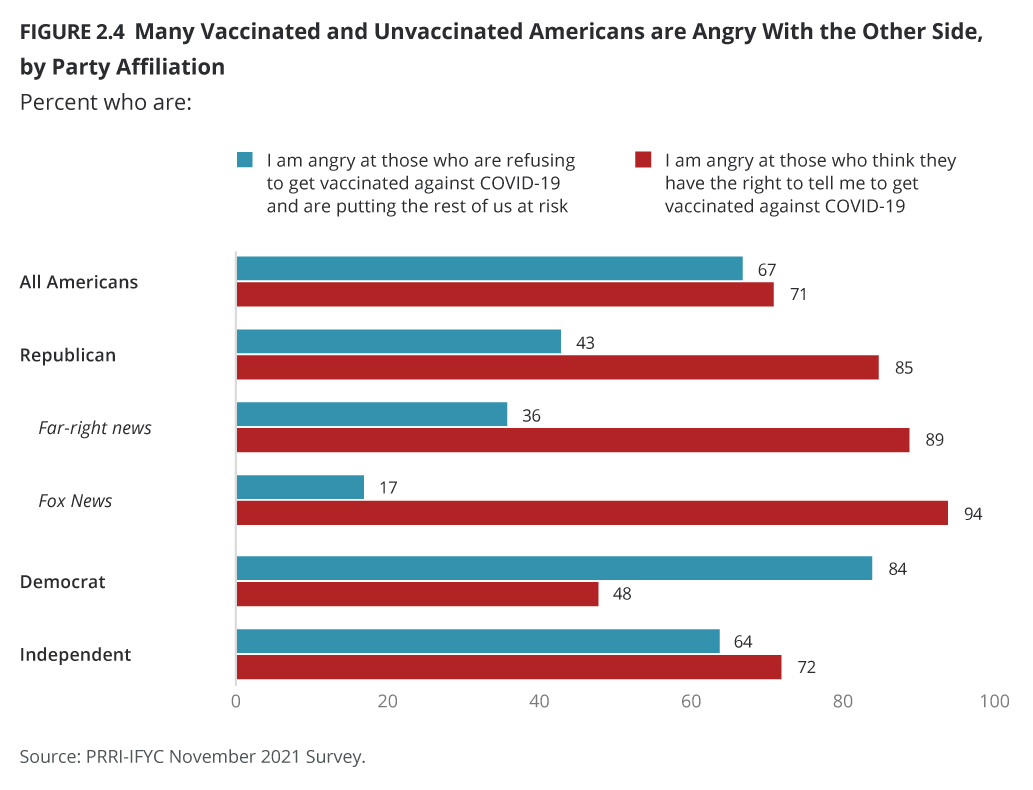
Those Who Refuse Vaccinations Should Face Higher Premiums/Costs
Americans are evenly divided over whether those who are eligible to be vaccinated against COVID-19 but refuse should be charged higher rates for health insurance and at hospitals if they become infected (50% agree vs. 49% disagree).
Democrats (70%) are more than twice as likely as Republicans (30%) to agree that those who refuse vaccinations should face higher premiums. Only 12% of Republicans who most trust far-right conservative media sources and one in four who most trust Fox News (26%) agree with this statement. Independents mirror the general population, with half (50%) agreeing.
Majorities of religiously unaffiliated Americans (58%), Hispanic Catholics (55%), members of other non-Christian religions (54%), and Black Protestants (53%) agree that eligible, unvaccinated people should face higher costs. Half of white mainline Protestants (50%) and white Catholics (49%) agree, and just over one in four white evangelical Protestants (27%) agree.[6]
Higher education levels correspond with being more likely to agree with this statement. Less than half of those with a high school education or less (41%) and some college (46%) as their top levels of formal education agree. Majorities of those who have four-year college degrees (62%) and those who have postgraduate degrees (70%) agree. White Americans with college degrees are notably more likely to agree that eligible vaccine refusers should pay higher premiums and costs than white Americans without college degrees are (63% vs. 40%).
Among those who say they are “angry at those who are refusing to get vaccinated against COVID-19 and are putting the rest of us at risk,” the vast majority (80%) agree that those who refuse vaccinations should face higher healthcare premiums or costs. Similarly, among those who say they are “angry at those who think they have the right to tell me to get vaccinated against COVID-19,” only one in ten (11%) agree that those who refuse vaccinations should face higher healthcare premiums or costs.
Family Disagreements
One in five Americans (19%) say that disagreements over COVID-19 vaccinations have caused major conflict in their families, compared to 80% who disagree. These reported experiences are generally consistent across political affiliation, religious affiliation, race, education, age, and gender. Notably, however, Hispanic Americans (25%)—including both Hispanic Protestants (27%) and Hispanic Catholics (23%)—are more likely than Americans of other races or ethnicities to report having major conflicts within their families over vaccinations.
However, unvaccinated Americans who are angry at those who think they have the right to tell them to get vaccinated against COVID-19 (25%) are slightly more likely than vaccinated Americans who are angry at those who are refusing to get vaccinated against COVID-19 (14%) to agree with this statement, indicating that they have had more family conflict over the issue.
Are Jobs Requiring Vaccines?
More than four in ten Americans (44%) report that their workplaces are requiring COVID-19 vaccinations, compared to 52% who say their workplaces are not requiring COVID-19 vaccinations. Americans are divided over whether companies should require proof of COVID-19 vaccination for employees to keep their jobs (52% favor, 48% oppose).
Democrats (76%) are more than three times as likely as Republicans (24%) to favor companies requiring proof of COVID-19 vaccinations. Less than one in ten Republicans who trust far-right conservative media sources the most (7%) and one in five who trust Fox News the most (18%) report the same. Independents mirror the general population (51%).
Majorities of Jewish Americans (70%), other Christians (67%), Hispanic Catholics (66%), religiously unaffiliated Americans (62%), other non-Christian religious Americans (59%), Black Protestants (58%), and Latter-day Saints (57%) favor companies requiring proof of COVID-19 vaccinations for employment. Less than half of white mainline Protestants (48%), Hispanic Protestants (47%), white Catholics (46%), and other Protestants of color (39%) agree. By contrast, only 26% of white evangelical Protestants favor companies requiring COVID-19 vaccinations. Nearly three in four white evangelical Protestants (74%) oppose these workplace requirements, including a slim majority (52%) who strongly oppose them.
Multiracial Americans (43%) and white Americans (48%) are less likely than Americans who identify with another race (64%), Hispanic Americans (59%), and Black Americans (55%) to favor companies requiring proof of COVID-19 vaccination. However, white Americans with college degrees are notably more likely to favor workplace vaccinations than white Americans without college degrees (62% vs. 40%).
Challenges and Barriers to Getting Adults Vaccinated
Religious Approaches to Increasing Vaccine Acceptance
Among Americans who are hesitant about getting vaccinated, one in four (25%) indicate that one or more faith-based approaches would make them at least somewhat more likely to get vaccinated, similar to the 26% who said the same in March and June. However, there is some evidence that the efficacy of these approaches among refusers has declined. Among vaccine rejecters, 4% say one or more faith-based approaches might sway them, a decrease from 12% in June.
The individual faith-based scenarios explored in the survey and their impact on improving vaccine uptake are summarized in Table 3.1.
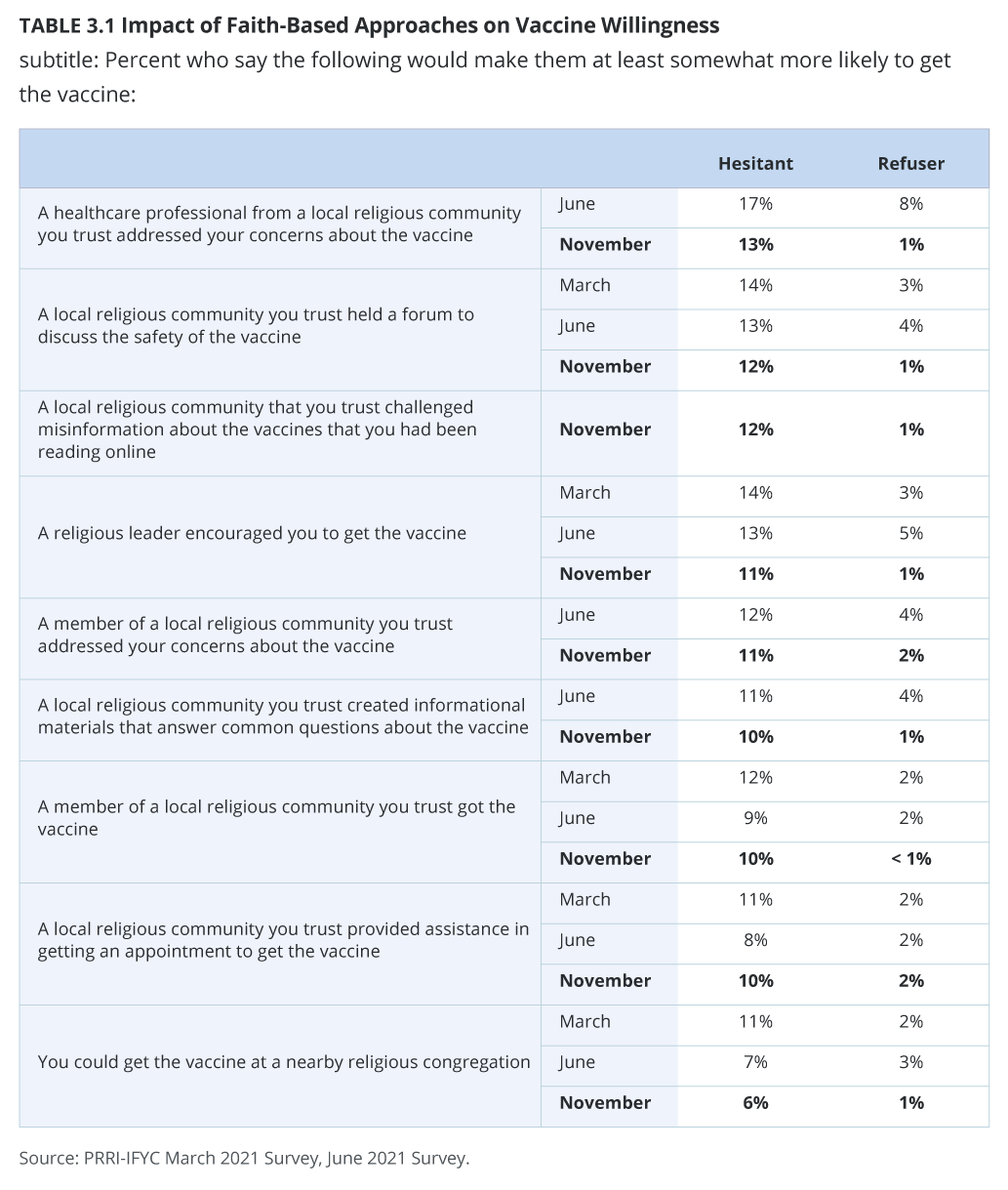
The influences of close friends, family members, and trusted healthcare providers also continue to show promise for encouraging people to get vaccinated, although the influence of these groups has dropped considerably since March. For example, 19% of those who are hesitant to get vaccinated say a close friend or family member getting a vaccine would make them more likely to get a vaccine (compared to 27% in June and 40% in March), and only 2% of refusers say the same (compared to 4% in June and 7% in March). Less than one in five (16%) of those who are hesitant, down from one-third in June (33%) and four in ten (40%) in March, say a doctor or healthcare provider getting a vaccine would make them more likely to get a vaccine, compared to 2% of refusers (decreased from 7% in June and 9% in March).
Among groups with strong attachments to religion, faith-based approaches rival the effects of family members and healthcare providers. Among those who attend religious services at least occasionally and are vaccine hesitant, 29% would be somewhat or much more likely to get vaccinated with one or more of these faith-based approaches (down from 38% in June and 44% in March), as would 6% of vaccine refusers who regularly attend religious services (a decrease from 19% in June and 14% in March).
Notably, among those who are already vaccinated and attend religious services at least a few times per year, more than one in four (27%) reported that one or more of the faith-based approaches made them more likely to get vaccinated, a slight decline from 32% in March. It is possible this decrease among those who are vaccinated is due to recollections of vaccination motivators becoming less clear as time passes since most made their initial decision to get vaccinated.
The potential impact of religious approaches is smaller among those who seldom or never attend religious services: 22% of this group who are vaccine hesitant indicate one or more of the religious scenarios would make them more likely to get vaccinated, along with 2% of this group who are vaccine refusers. These numbers among refusers have mostly held steady.
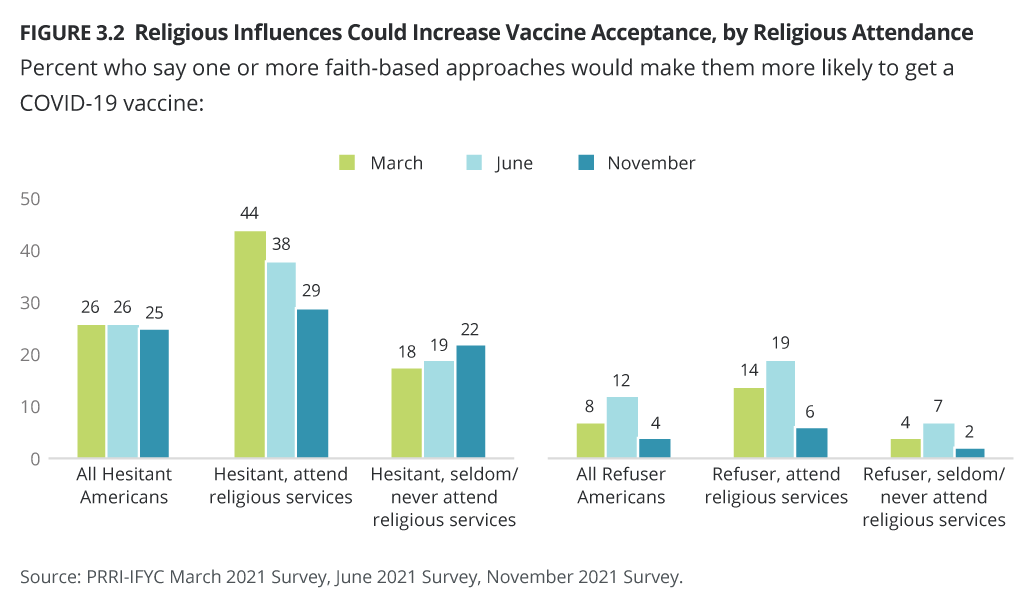
The vaccine-hesitant category has shrunk to the point that no single religious group has sufficient sample size to report how religious approaches might influence their willingness to get vaccinated. However, among all unvaccinated Americans (including those who plan to get vaccinated but have not yet, are hesitant, and are refusers), there are still indications that some religious Americans—particularly Christians of color—could be reached by one or more religious approaches. One-third of Christians of color who are unvaccinated (31%), including Black Protestants, Hispanic Protestants, and Hispanic Catholics, say that one or more of these religious approaches could help get them over the line. The sample size is too small to report among only refusers.
The proportion of unvaccinated white evangelical Protestants who could be reached by these religious approaches has dwindled to 14%, and to 6% among only refusers. About one in ten unvaccinated white Catholics (11%), unvaccinated white mainline (non-evangelical) Protestants (9%), and unvaccinated religiously unaffiliated Americans (9%) report that one or more of these religious approaches could sway them. Very small proportions of white mainline Protestant (2%) and religiously unaffiliated Americans (3%) who are refusers say the same.
Among those who are vaccinated, Latter-day Saints and Christians of color are particularly likely to report that faith-based approaches did matter in their decisions to get vaccinated. Nearly half of vaccinated Latter-day Saints (46%) and a majority of those who attend religious services regularly (54%) say that one or more of these faith-based approaches helped them decide to get vaccinated. More than one in four vaccinated Black Protestants (27%), other Christians (27%), and Hispanic Catholics (26%) reported the same, and those proportions are higher among affiliates who attend services (39%, 38%, and 36%, respectively). One in five vaccinated Americans who are Buddhist, Hindu, Muslim, or belong to another world religion (that is not Judaism or Christianity) (21%) report these approaches helped, and a slim majority of this group who attend religious services (51%) report religious appeals making a difference.
Fewer vaccinated white evangelical Protestants (16%), Jewish Americans (16%), Hispanic Protestants (15%), white mainline Protestants (12%), white Catholics (11%), and religiously unaffiliated Americans (5%) say any of these religious approaches made them more likely to get vaccinated. Among all of these groups, except the religiously unaffiliated, those who attend services regularly are more likely to say religious appeals helped them decide to get vaccinated, including 21% among white evangelical Protestants, 36% among Jewish Americans, 21% of Hispanic Protestants, 24% of white mainline Protestants, and 15% of white Catholics.
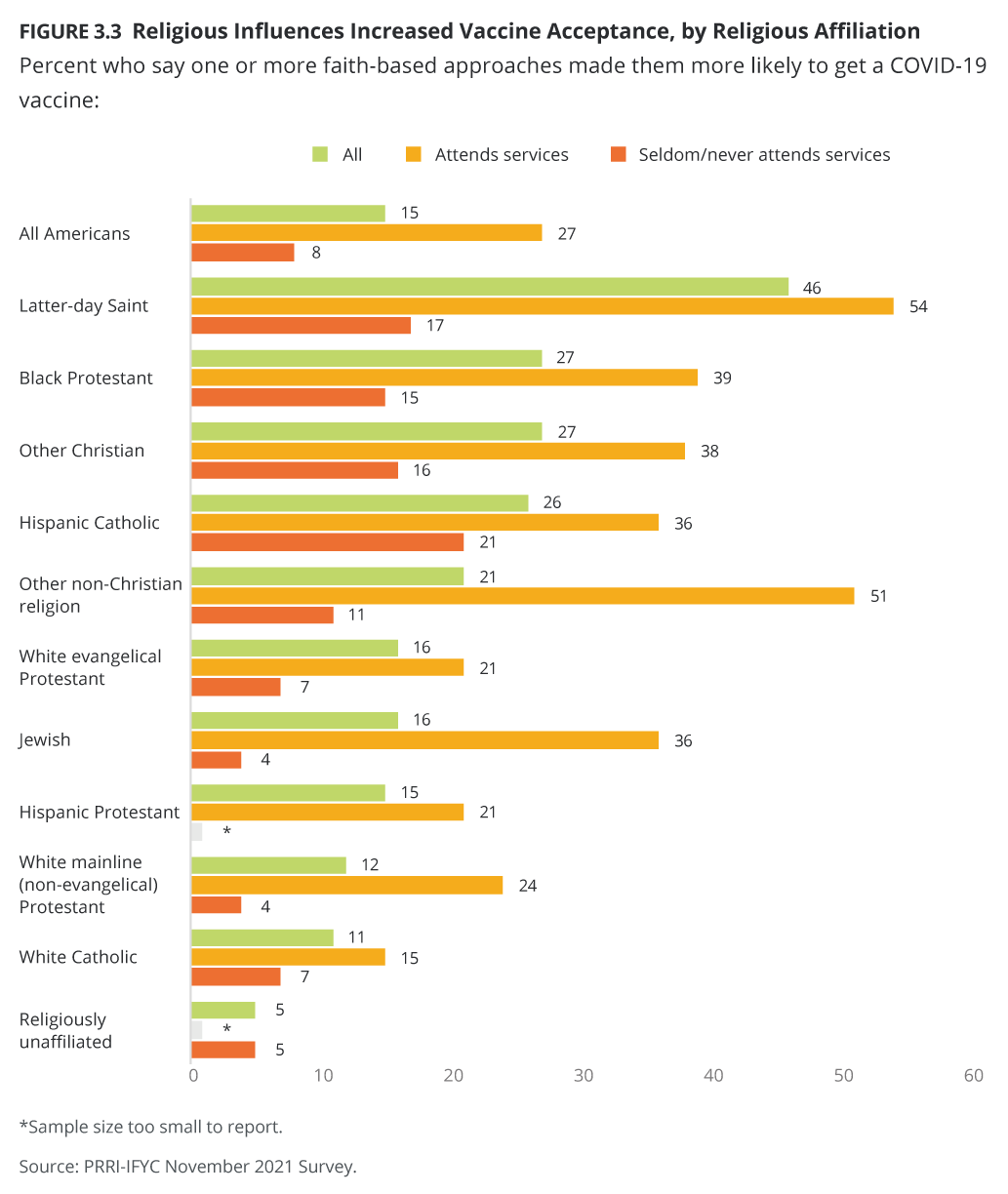
Concerns, Skepticism, and Barriers to Getting Vaccinated Among Adults
Nearly six in ten Americans (57%) are concerned that they or someone in their family will get sick from COVID-19. After dropping to 45% in June, the level of concern increased to be much closer to March levels (62%).
Among those who are at least somewhat worried about getting sick with COVID-19, 83% are vaccine accepters, 10% are hesitant, and 7% are refusers. The rate of hesitancy among those who are at least somewhat worried about COVID-19 has dropped precipitously, from 29% in March to 10% today. Among those who are not too worried about themselves or someone in their family getting sick, vaccine acceptance has risen from 55% in March to 75%, hesitancy has dropped from 29% to 10%, and refusal has remained relatively steady, at 15% (from 16% in March). Among those who are not at all worried, 61% are vaccine accepters (up from 42% in March), 7% are hesitant (down from 21% in March), and refusal has decreased very slightly, to 32% (from 36% in March).
Concerns About the Vaccines
About four in ten Americans (39%) are concerned that they would experience serious side effects from the vaccine, a rate that has held relatively steady from 36% in June, after falling from 49% in March. About three in ten vaccine accepters (28%) say they are very or somewhat worried about serious side effects, compared to eight in ten of those who are hesitant (78%) and refusers (77%).
Half of Americans (50%) worry that the long-term effects of COVID-19 vaccines are unknown. The proportion has gone up slightly, though not significantly, since June (47%), after falling from 58% in March. Nearly four in ten Americans (38%) worry that the vaccines are not as safe as they are said to be, which has held relatively steady since June (36%) after falling from 45% in March. Four in ten Americans (40%) worry that the vaccines are not as effective as they are said to be, which has risen from 34% in June after falling from 43% in March.
A four-point composite index was created to evaluate Americans’ concerns about COVID-19 vaccines, including the four areas of concern listed above. Each question was combined using an additive scale that was then converted into a four-point scale, where a score of 1 indicates major concerns, 2 indicates moderate concerns, 3 indicates few concerns, and 4 indicates very few concerns about the COVID-19 vaccines. Using this scale, compared to June, major concerns about the vaccine increased slightly, from 18% in June to 22% in November, moderate concerns remained constant, at 31% in June and November, few concerns decreased slightly, from 36% in June to 34% in November, and very few concerns also decreased slightly, from 15% in June to 13% in November.
A majority of Republicans (63%) have at least moderate concerns about the vaccines, compared to 53% of independents and 41% of Democrats. These proportions have risen for Republicans and independents, from 54% and 48%, respectively, in June. The share of Republicans with concerns about vaccines who most trust Fox News rose to 60%, back up to March levels (62%), after dipping to 51% in June. Among Republicans who most trust far-right news sources, the proportion who report at least moderate concerns has increased slightly, from 72% in June to 77%.
Nearly two-thirds of Hispanic Protestants (65%), white evangelical Protestants (64%), and Hispanic Catholics (63%) have moderate or major concerns about the vaccines. Majorities of Black Protestants (58%), followers of other non-Christian religions (56%), other nonwhite Protestants (55%), and Latter-day Saints 54%) express at least moderate concerns. Half or less of other Christians (50%), white Catholics (49%), white mainline Protestants (49%), religiously unaffiliated Americans (43%), and Jewish Americans (38%) have at least moderate concerns.
About six in ten Hispanic Americans (61%), Black Americans (60%), and multiracial Americans (57%) have at least moderate concerns about COVID-19 vaccines. Half of Americans of another race (50%) and white Americans (49%) report at least moderate concerns. These rates have held steady for Black Americans since June (59%). Concerns have risen among Hispanic, multiracial, and white Americans, from 58%, 52%, and 46% in June, respectively.
Vaccine-related concerns decrease with greater levels of formal education. Among those with high school degrees or less, six in ten (63%) have at least moderate concerns, including three in ten (30%) with major concerns. Concerns among this population increased from 59% in June. A small majority of those with some college experience (55%) have at least moderate concerns, which has increased, from 49% in June. By contrast, 41% of Americans with four-year college degrees and only 36% of those with postgraduate degrees have at least moderate concerns. Concerns fell among Americans with four-year college degrees, from 44% to 41%, in June. Concerns went up among Americans with postgraduate degrees, from 32% to 36%.
Americans’ concerns about the vaccines decrease with age. Among Americans 18–29 and 30–49, 59% express concerns about the vaccines. Vaccine concerns among the 18–29 age group have increased eight percentage points since June, from 51%, but remained the same for ages 30–49, at 59%, in June. Half of Americans ages 50–64 (53%) and less than four in ten Americans over the age of 65 are concerned (38%), representing a slight increase since June in both groups, from 49% and 34%, respectively.
Consistent with data from June, women are more likely than men to express concerns with COVID-19 vaccines. Nearly six in ten (55%) express at least moderate concerns, which has not changed since June, though the share who have major concerns has modestly increased to 23%, from 21% in June. Notably, among men, concern has increased to 50%, from 43% in June.
Belief That Government Is Hiding Other Treatments That Are Just as Effective
Four in ten Americans (42%) agree with the statement “The government is not telling us about other treatments for COVID-19 that are just as effective as the vaccine.” Vaccine refusers (82%) and those who are hesitant (69%) are more likely than vaccine accepters (32%) to believe that the government is hiding treatments for COVID-19 that are as effective as the vaccines. Those who know someone who has died from COVID-19 (39%) are less likely to agree with this than those who don’t know someone who died of the disease (47%).
Republicans (62%) are more than twice as likely as Democrats (23%) to believe in this conspiracy theory. Independents fall in between, at 44%. Nine in ten Republicans who trust far-right news (89%), 69% of those who trust Fox News, and 46% who trust mainstream news believe in this conspiracy theory.
A majority of white evangelical Protestants (62%) hold this view. Less than half of Hispanic Catholics (48%), white Catholics (44%), and white mainline Protestants (42%) agree, as do 39% of Black Protestants and 29% of the religiously unaffiliated.[9]
A majority of multiracial Americans (55%) believe that the government is concealing an effective treatment for COVID-19, followed by 49% of Hispanic Americans, 41% of white Americans, 39% of Black Americans, and 31% of Americans of another race.
Half of Americans without college degrees (50%) believe in this conspiracy theory, compared to 27% of Americans with college degrees.
Reasons Not to Get Vaccinated
Belief that the seriousness of COVID-19 has been overblown
One in four Americans who are not vaccinated (26%) say a critical reason they have not gotten a COVID-19 vaccine is their belief that the seriousness of COVID-19 has been overblown, and an additional 39% say that is one of the reasons but not a critical one. About one-third of Americans (35%) do not mention this as a reason. These views are generally unchanged from June. Vaccine refusers (32%) are more likely than the vaccine hesitant (18%) to cite the seriousness of COVID-19 being overblown as a critical reason for not getting a COVID-19 vaccine.
Skepticism about the seriousness of COVID-19 varies by partisanship. Three in ten unvaccinated Republicans (29%), 27% of unvaccinated independents, and 21% of unvaccinated Democrats say a critical reason they have not gotten a COVID-19 vaccine is their belief that the seriousness of COVID-19 has been overblown. Nearly half of unvaccinated Republicans (48%), compared to 37% of unvaccinated independents and 25% of unvaccinated Democrats, say it is one of the reasons but not a critical reason. Only one in four unvaccinated Republicans (24%) say this is not a reason they have not gotten vaccinated, compared to 36% of unvaccinated independents and a majority of unvaccinated Democrats (54%).
Unvaccinated Black Americans are significantly less likely than unvaccinated white or Hispanic Americans to say that thinking the seriousness of COVID-19 has been overblown is a critical reason they are not vaccinated (14% vs. 28% and 25%, respectively).[10] A majority of unvaccinated Black Americans (54%) say this is not a reason, compared to 31% of unvaccinated white Americans and 37% of unvaccinated Hispanic Americans.
Lack of trust in the healthcare system
Nearly three in ten unvaccinated Americans (29%) cite their lack of trust in the healthcare system as a critical reason for not getting vaccinated. This marks a slight increase over the 23% who said this was a critical reason in June. Four in ten (41%) cite this as one of the reasons but not a critical one (similar to 39% in June), and 30% say it is not a reason (down from 38% in June). There are few differences in citing trust in the healthcare system as a reason not to get vaccinated by partisanship, religion, or demographics.
Cannot get vaccinated due to a health condition
Slightly less than one in ten Americans who are not vaccinated (9%) say that a critical reason for being unvaccinated is that they cannot get vaccinated due to a health condition. Another 16% say that a health condition is one of the reasons but not a critical one. About three in four (74%) say this is not a reason. One in ten vaccine hesitaters (10%) and 8% of refusers cite a health condition as a critical reason for not being vaccinated.
Do not have time to go get vaccinated or deal with possible side effects
Among unvaccinated Americans, about one in ten (13%) cite not having time to get vaccinated or deal with possible side effects as a critical reason for not getting vaccinated. Another one in four (24%) cite time as one of the reasons for not getting vaccinated. Six in ten unvaccinated Americans (63%) say this is not a reason. These rates have not changed significantly since June.
Inability to take time off work or school to get vaccinated
Among vaccinated Americans, 8% cite being able to take time off work or school to get vaccinated and deal with possible side effects as a critical reason that they are vaccinated. Another 20% cite this as one of the reasons.
Hispanic Americans (15%) are the most likely to cite not being able to take time off work or school as a critical reason for not getting vaccinated, followed by Americans of another race (13%), Black Americans (11%), white Americans (5%), and multiracial Americans (<1%).[11]
Do not have a reliable way to get to a vaccination site
Just 3% of unvaccinated Americans cite a lack of transportation to a vaccine site as a critical reason for not getting vaccinated, and 7% say not having transportation is one of the reasons, but not a critical reason. These rates have not changed since June 2021.
One in five vaccinated Americans (19%) cite the fact that they were easily able to get to a vaccine site nearby as a critical reason for getting vaccinated. Black Americans (26%) are more likely than other racial or ethnic groups to cite being easily able to get to a vaccine site as a reason for getting vaccinated.
Young children at home and do not have childcare
Among unvaccinated Americans, 3% cite a lack of childcare as a critical reason for not getting vaccinated, with another 8% saying that it’s one of the reasons they are not vaccinated. These numbers are relatively stable from June 2021, when 4% said childcare was a critical reason for not getting vaccinated and 10% said it was one of the reasons. Vaccine refusers (4%) and the hesitant (3%) are equally likely to cite childcare as a critical reason for not being vaccinated.
Five percent of Americans who are vaccinated cite the availability of childcare as a critical reason that they got vaccinated. Another 6% say that being able to access childcare is one of the reasons they are vaccinated. Americans of another race, Black, and Hispanic Americans are the most likely to cite childcare as a critical reason for getting vaccinated, at 9%. Seven percent of multiracial Americans and 2% of white Americans cite childcare as a critical reason.[12]
Reasons Americans Got Vaccinated
Worry about potential for serious illness or death
Nearly six in ten vaccinated Americans cite worry about the potential of serious illness or death if they become infected as a reason they decided to get vaccinated (58%). About one in four (26%) cite this as one of the reasons but not a critical one, and 15% do not mention the potential of serious illness or death as a reason. Democrats (70%) are more likely than independents (53%) and Republicans (46%) to cite this as a reason for getting vaccinated. A majority of vaccinated Republicans who trust mainstream news (54%) cite worry about serious illness or death as a critical reason for getting vaccinated, as do half of Fox News viewers (50%), 45% of those who trust conservative outlets, and one-third of those who do not watch TV news (33%).
Women are more likely than men to cite the possibility of serious illness or death as a reason they got vaccinated (60% vs. 56%).
Those who know someone who died of COVID-19 are more likely to cite being worried about the potential of serious illness or death as a critical reason for getting vaccinated (62%) than those who don’t know someone who died of COVID-19 (53%).
Wanted to get vaccinated to protect those who cannot get vaccinated
Four in ten vaccinated Americans (41%) cite wanting to protect those who cannot get vaccinated as a critical reason for their decision to get a vaccine.
Democrats (52%) are more than twice as likely as Republicans (24%) to cite protecting those who cannot get vaccinated as a critical reason. Four in ten independents (40%) say protecting people who cannot get vaccinated is a critical reason.
The religiously unaffiliated (50%), other nonwhite Protestants (49%), and Black Protestants (48%) are the most likely to be motivated by the desire to protect those who can’t get vaccinated. They are followed by other Christians (45%), Hispanic Catholics (44%), other non-Christian religious Americans (44%), Jewish Americans (43%), Latter-day Saints (39%), white Catholics (36%), white mainline Protestants (34%), Hispanic Protestants (33%), and white evangelical Protestants (27%).
Vaccinations for Children
Parents are much more hesitant about getting their children vaccinated against COVID-19 than they are about getting vaccinated themselves. About four in ten Americans who are parents of children under age 18 (42%) are vaccine acceptant for their children, including 14% who say their children have already been vaccinated and 28% who say they will get their children vaccinated as soon as possible.
As with adult vaccinations, acceptance is increasing over time, and the current level is a significant increase from 35% in June. One-third of parents are hesitant to get their children vaccinated (33%, down from 40% in June), including around one in four parents (23%) who say they will wait to see how vaccines are working for other children and 10% who say they would only get their children vaccinated if it were required for work, school, or other activities. As with adults, the proportion of vaccine refusers has held steady. More than one in five parents of children under 18 say they will not get their children vaccinated (23%), the same as in June.
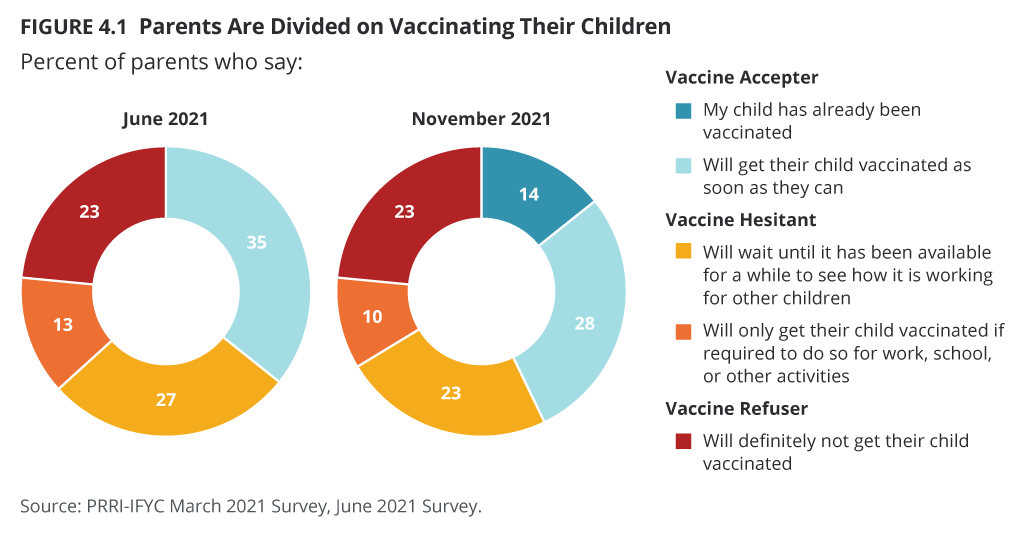
Patterns in acceptance, hesitancy, and refusal to get children vaccinated generally mirror the same patterns across demographic groups as self-reported vaccination status, albeit with greater rates of hesitancy and refusal for children. Additionally, most of these attitudes have not shifted significantly since June. Among those who are vaccine acceptant, 60% are vaccine acceptant for their children, 34% are hesitant, and 6% say they will not get their children vaccinated. Among vaccine-hesitant parents, just 3% will get their children vaccinated as soon as possible, 73% are hesitant to get their children vaccinated, and 23% say they will not get them vaccinated (up from 13% in June). Vaccine rejecters almost universally will not get their children vaccinated (91%).
More than six in ten Democrats (62%) are vaccine acceptant for their children (up from 49% in June), while 29% are hesitant and 9% say they will not get their children vaccinated. More independents are undecided, with 39% acceptant, 37% hesitant, and 23% refusing vaccines when it comes to their children. Republicans have not moved in their views about getting their children vaccinated against COVID-19 since June. Republicans are least likely to be acceptant (27%), while 36% are hesitant and 37% say they will not get their children vaccinated.
White evangelical Protestants (24%) are the least likely religious group to say they have gotten their children vaccinated or will get their children vaccinated as soon as possible, while 32% are hesitant to get their children vaccinated (32%) and 44% say they will not get their children vaccinated. Nearly half of religiously unaffiliated Americans (43%), white mainline Protestants (44%, up from 33% in June), and white Catholics (47%) are vaccine acceptant for their children.[13] A majority of Hispanic Catholics (54%) say they have gotten or will get their children vaccinated.
Americans of other races are most likely to say they will get their children vaccinated as soon as they can (56%), compared to smaller shares of Hispanic Americans (51%, up from 39% in June), white Americans (39%, up from 32% in June), and Black Americans (31%).
Parents with high school degrees or less (35%, up from 26% in June) are about half as likely as those with postgraduate degrees (63%, up from 52% in June) to say they will get their children vaccinated as soon as possible, while those with some college experience but no degree (36%) and those with four-year college degrees (54%, up from 45% in June) fall in between.[14] Parents with a high school degree or less (28%) or some college (27%) are almost twice as likely as those with four-year degrees (17%) or postgraduate degrees (11%) to say they will not get their children vaccinated.
Concerns About Vaccines for Children
Majorities of parents are somewhat or very worried about the safety and efficacy of COVID-19 vaccines for children, including concerns that the long-term effects of the COVID-19 vaccines are unknown for children (65%), that their children will experience serious side effects from the vaccines (61%), that the vaccines are not as safe as they are said to be for children (59%), or that the vaccines are not as effective as they are said to be for children (54%).
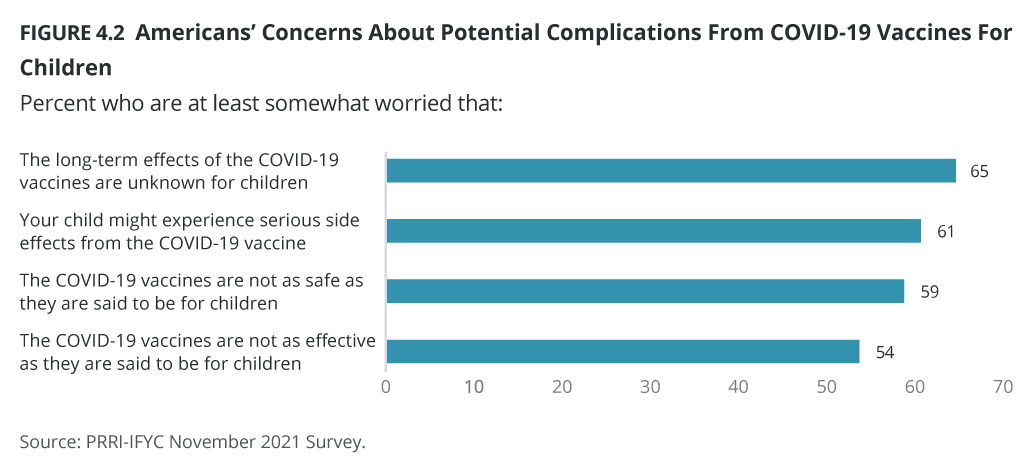
A four-point composite index was created to evaluate parents’ concerns about COVID-19 vaccines for children, including the four areas of concern listed above. Each question was combined using an additive scale that was then converted into a four-point scale where a score of 1 indicates major concerns, 2 indicates moderate concerns, 3 indicates few concerns, and 4 indicates very few concerns about the vaccines for children. Using this scale, around seven in ten parents have either major (37%) or moderate (31%) concerns about COVID-19 vaccines for children, while about one-third have either few (21%) or very few (11%) concerns.
Unsurprisingly, most parents who have major concerns about COVID-19 vaccines for children are either vaccine hesitant (39%) or refusers (49%) when it comes to their children, while just 13% say they have gotten their child vaccinated or will do so as soon as possible. Those with moderate concerns are slightly less likely to be vaccine accepters for their children (43%) than to be vaccine hesitant for their children (50%). Just 7% of parents with moderate concerns about getting their children say they will not get their child vaccinated. Majorities of parents with some concerns (80%) or few concerns about (69%) about getting their child vaccinated are vaccine accepters, while only a handful of parents with some concerns or few concerns are hesitant to vaccinate their child (12% and 12%, respectively), or will not get their children vaccinated (7% and 18%, respectively).
Majorities of parents across the political spectrum express at least moderate concerns about the vaccines for children, although concern is higher among Republican parents (79%) than Democrat parents (57%). Seven in ten independent parents (70%) express at least moderate concerns.
Majorities of parents in all religious groups express at least moderate concerns about vaccinations for children: white evangelical Protestants (78%), Hispanic Catholics (77%), white Catholics (65%), white mainline Protestants (64%), and religiously unaffiliated Americans (59%).[15]
White parents (65%) are less likely than Hispanic parents (75%) to express concerns about vaccinations for children but do not differ significantly from Black parents (71%). However, white parents without college degrees are notably more likely to express concerns than white parents with college degrees (71% vs. 52%).
Less than half of parents over age 65 (48%) report at least moderate concerns, compared to 64% of parents ages 50–64, 72% of parents ages 30–49, and 67% of parents ages 18–29. About three in four women who are parents (73%) express at least moderate concerns, including 41% who express major concerns. A majority of men who are parents (64%) express at least moderate concerns, including 33% who express major concerns.
Barriers to Getting Children Vaccinated
Time Off
Among parents whose children are not vaccinated and who do not plan to get their children vaccinated as soon as possible, about one in ten (7%) say a critical reason preventing them from getting their children a COVID-19 vaccine is not having time to take them to get vaccinated or deal with possible side effects, and an additional 13% say that is one of the reasons but not a critical one. About 79% of parents who are not planning to get their children vaccinated say this is not a reason.
Existing Health Conditions
Less than one in ten parents whose children are not vaccinated and who do not plan to get their children vaccinated as soon as possible (5%) say a critical reason preventing their children from getting a COVID-19 vaccine is an existing health condition, and an additional 13% say that is one of the reasons but not a critical one. More than eight in ten parents of unvaccinated children (82%) say this is not a reason.
Lack of Transportation
Only three percent of parents whose children are not vaccinated and who do not plan to get their children vaccinated as soon as possible say a critical reason preventing their children from getting a COVID-19 vaccine is that they do not have a reliable way to get their child to a vaccination site, and an additional 8% say that is one of the reasons but not a critical one. Most parents of unvaccinated children (89%) say this is not a reason.
Distrust of the Healthcare System
About one in five parents whose children are not vaccinated and who do not plan to get their children vaccinated as soon as possible (21%) say a critical reason preventing their children from getting a COVID-19 vaccine is that they do not trust the healthcare system, and an additional one-third (32%) say that is one of the reasons but not a critical one. Nearly half of parents of unvaccinated children (47%) say this is not a reason.
Belief That COVID-19 Is Not a Serious Risk for Children
One in five parents whose children are not vaccinated and who do not plan to get their children vaccinated as soon as possible (20%) say a critical reason preventing their children from getting a COVID-19 vaccine is that they think COVID-19 is not a serious risk for children, and an additional 27% say that is one of the reasons but not a critical one. The majority of parents of unvaccinated children (53%) say this is not a reason.
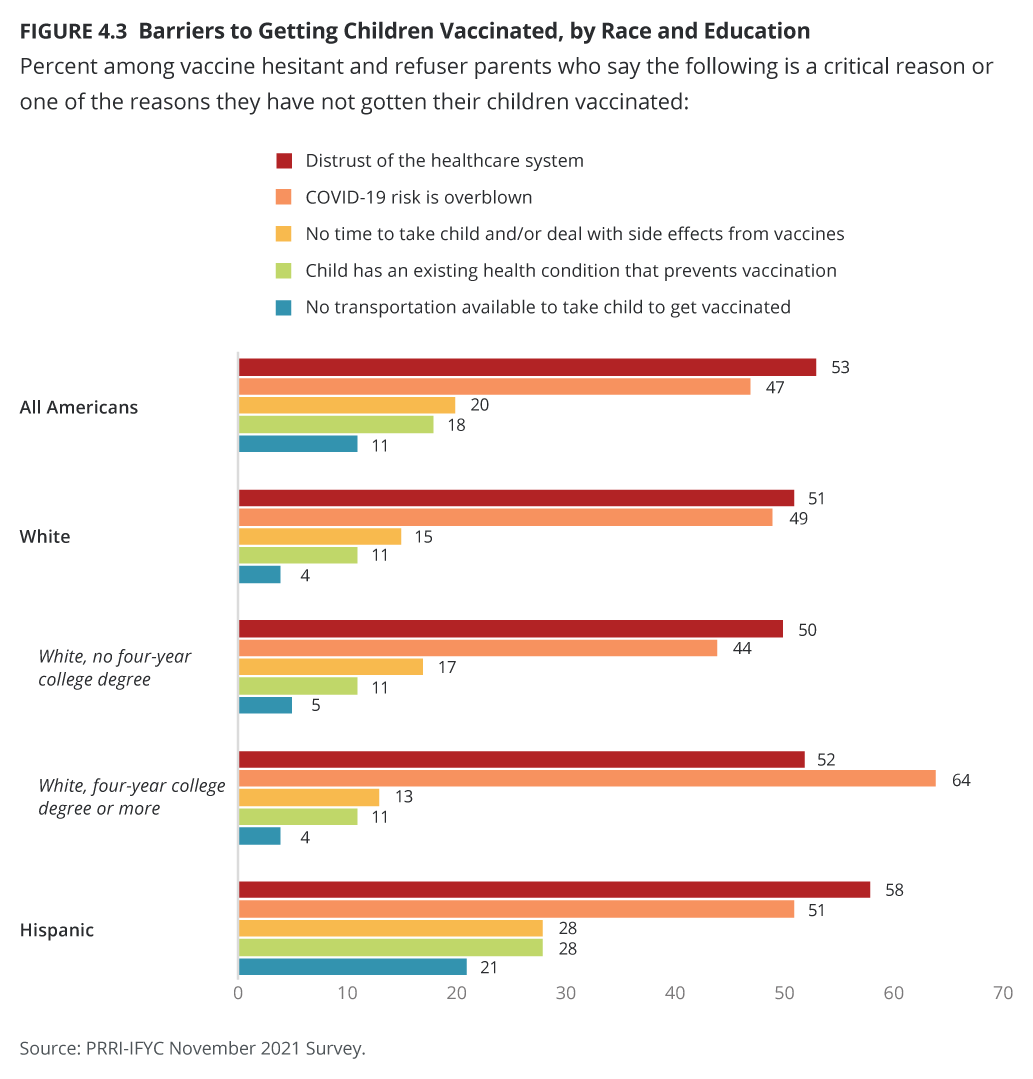
Faith-Based Approaches to Encouraging Vaccination for Children
About one in ten or fewer parents whose children are not vaccinated and who do not plan to get their children vaccinated as soon as possible report that religious approaches would make them much more likely or somewhat likely to get their children vaccinated for COVID-19: (a) a healthcare professional from a local religious community they trust addressed their concerns about the vaccine for children (11%); (b) a local religious community they trust held a forum to discuss the safety of the vaccine for children (9%); (c) a local religious community they trust created informational materials that answer common questions about the vaccines for children (7%); (d) they could get their children vaccinated at a nearby religious congregation (6%); or (e) a local religious community they trust provided assistance in getting an appointment to get their children vaccinated (5%).
Together, 16% of parents whose children are not vaccinated and who do not plan to get their children vaccinated as soon as possible report that one or more of these religious approaches could convince them to get their children vaccinated. White Christian parents who do not plan to get their children vaccinated are less likely than parents who are Christians of color and do not plan to get their children vaccinated (29%) to say one or more religious approaches could positively influence their decision.[16]
Survey Methodology
The survey was designed and conducted by PRRI and IFYC among a random sample of 5,366 adults (age 18 and up) living in all 50 states in the United States and who are part of Ipsos’s Knowledge Panel and an additional 355 who were recruited by Ipsos using opt-in survey panels to increase the sample sizes in smaller states. Interviews were conducted online between October 18 and November 9, 2021. The survey was made possible by generous support from the John Templeton Foundation.
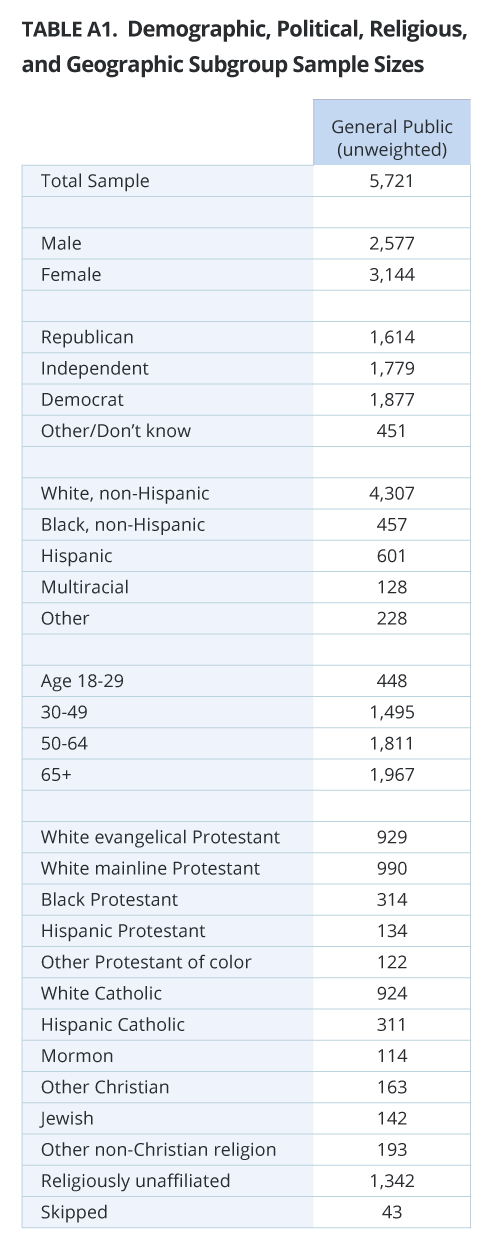 Respondents are recruited to the KnowledgePanel using an addressed-based sampling methodology from the Delivery Sequence File of the USPS – a database with full coverage of all delivery addresses in the U.S. As such, it covers all households regardless of their phone status, providing a representative online sample. Unlike opt-in panels, households are not permitted to “self-select” into the panel; and are generally limited to how many surveys they can take within a given time period.
Respondents are recruited to the KnowledgePanel using an addressed-based sampling methodology from the Delivery Sequence File of the USPS – a database with full coverage of all delivery addresses in the U.S. As such, it covers all households regardless of their phone status, providing a representative online sample. Unlike opt-in panels, households are not permitted to “self-select” into the panel; and are generally limited to how many surveys they can take within a given time period.
The initial sample drawn from the KnowledgePanel was adjusted using pre-stratification weights so that it approximates the adult U.S. population defined by the latest March supplement of the Current Population Survey. Next, a probability proportional to size (PPS) sampling scheme was used to select a representative sample.
To reduce the effects of any non-response bias, a post-stratification adjustment was applied based on demographic distributions from the most recent American Community Survey (ACS). The post-stratification weight rebalanced the sample based on the following benchmarks: age, race and ethnicity, gender, Census division, metro area, education, and income. The sample weighting was accomplished using an iterative proportional fitting (IFP) process that simultaneously balances the distributions of all variables. Weights were trimmed to prevent individual interviews from having too much influence on the final results. In addition to an overall national weight, separate weights were computed for each state to ensure that the demographic characteristics of the sample closely approximate the demographic characteristics of the target populations. The state-level post-stratification weights rebalanced the sample based on the following benchmarks: age, race and ethnicity, gender, education, and income.
These weights from the KnowledgePanel cases were then used as the benchmarks for the additional opt-in sample in a process called “calibration.” This calibration process is used to correct for inherent biases associated with nonprobability opt-in panels. The calibration methodology aims to realign respondents from nonprobability samples with respect to a multidimensional set of measures to improve their representation.
The margin of error for the national survey is +/- 1.7 percentage points at the 95% level of confidence, including the design effect for the survey of 1.7. In addition to sampling error, surveys may also be subject to error or bias due to question wording, context, and order effects. Additional details about the KnowledgePanel can be found on the Ipsos website: https://www.ipsos.com/en-us/solution/knowledgepanel
Endnotes
[1]“Other Protestant of color” includes all Protestants who are not white, Black, or Hispanic (including Asian American or Pacific Islander, multiracial, Native American, or any other race or ethnicity). Categories were combined due to sample size limitations. “Other Christian” includes all Christians who are not specified in any other category, including Catholics who are Black, Asian American or Pacific Islander, multiracial, Native American, and any other race or ethnicity; Jehovah’s Witnesses; Orthodox Christians; and any other Christian group. “Other non-Christian religion” includes those who are Muslim, Hindu, Buddhist, Unitarian Universalist, or any other world religion.
[2]Sample sizes of unvaccinated members of other religious groups are too small to report.
[3]Sample sizes of other religious groups are too small to report.
[4]“Americans of other races” includes Asian American or Pacific Islander, Native American, and any other single race or ethnicity. Categories were combined due to small sample sizes. The number of cases of Americans who identify with other racial groups without a college education is 72, the number of cases of multiracial Americans without a college education is 76 and with a college education is 52. Despite the small sample sizes, differences in education are statistically significant.
[5]These numbers are slightly below CDC reports of approximately 79% of U.S. adults who have received at least one dose of a COVID-19 vaccine as of late October/early November.
[6]The number of cases for Latter-day Saints (Mormons) for this question is 96. The number of cases for other nonwhite Protestants is too small to report here.
[7]The number of cases for all other religious groups is too small to report here.
[8]The number of cases for all other religious groups is too small to report here.
[9]All other religious groups have sample sizes that are too small to report.
[10]Sample sizes for unvaccinated Black Americans (n=86) and unvaccinated Hispanic Americans (n=87) are small and should be interpreted with caution.
[11]The number of cases for multiracial Americans is 86 for this question.
[12]The number of cases for multiracial Americans is 86 for this question.
[13]Changes for white mainline Protestants are statistically significant at p-value of 0.068 (0.10 level). All other religious groups have small sample sizes (< 100).
[14]Changes for four-year college graduates between June and November are statistically significant at p-value of 0.065 (0.10 level).
[15]The number of cases for all other religious groups is too small to report here.
[16]All other religious groups’ sample sizes are too small to report.
Recommended Citation
“Religious Identities and the Race Against the Virus: Successes and Opportunities for Engaging Faith Communities on COVID-19 Vaccination” PRRI
IFYC (November 28, 2021). https://www.prri.org/research/religious-identities-and-the-race-against-the-virus-american-attitudes-on-vaccination-mandates-and-religious-exemptions/




